10 Essential Essay-Length Memoirs You Can Read Online for Free
Short insights with big impacts.

- Photo Credit: Unsplash/Sincerely Media
Are you a fan of anecdotal reading, but lacking the time to dive into a 300 page memoir? Do you love the specificity of short essays? Or are you looking for a taste of an author’s work before you peek any deeper into their psyche? Then you might consider looking into some essay-length memoirs—think of them as memoir examples, rather than full-fledged books.
Whether you’re hoping to find a piece of writing that makes you feel less alone, or you want to expand your understanding of the human race, these true accounts will stick with you. Here are 10 phenomenal memoir examples you can read online right now for free.
Related: The Best Essay Collections to Add to Your TBR List
"Me Talk Pretty One Day"
by David Sedaris

- Photo Credit: Chris Karidis/Unsplash
Comedian and author David Sedaris wrote the memoir essay “Me Talk Pretty One Day” about his time living in Paris to learn the French language. While matriculating as a middle-aged man has its benefits—"No one will ever again card me for a drink or demand that I weave a floor mat out of newspapers"—it doesn't spare him, or any of his peers, from the abuse of their teacher. Sedaris recounts carrying a special brand of insecurity, tackling the complexity of language and the thrill of being a humorist going toe-to-toe with a stern and scathing professeure .
For collections of Sedaris’ writing, be sure to check out Dress Your Family in Corduroy and Denim and When You Are Engulfed in Flames .
Related: 13 Famous Memoirs Everyone Should Read Once
"Age Appropriate"
by Jen Doll
Jen Doll is a freelance journalist—whose credits include articles for The Atlantic , Esquire , and New York Magazine —and author of the young adult novel Unclaimed Baggage . In this anecdotal essay about a summer vacation spent with family, Doll explores what it means to bring your teenage self along into adulthood. Stuck between the frustration of being treated like a child by her parents, and the ever-present desire to run from the strains of adult self-sufficiency, she writes to come to terms with the different selves she houses in the context of her surroundings.
Related: 15 Best Memoirs That Will Change Your Outlook on Life
"The Price of Black Ambition"
by Roxane Gay
In “The Price of Black Ambition,” Roxane Gay interweaves a timeline of her struggles and successes with a frank discussion on the sociopolitical racism inherent in the United States. She speaks on the fact that children of color are often given an inflated sense of “ambition” at a young age, as they must work twice as hard with half as much to achieve opportunities that are more carelessly given to their white peers. And, despite the exceptional amounts of work people of color put in to move forward in life, their efforts are regularly regarded as less than—their presence in “white” circles is considered a fluke or consequence of required diversity. She refers to her ambition as a hunger that can never be satisfied in the current status quo of America.
Gay is most notable for her essay collection Bad Feminist , as well as her fiction novel An Untamed State .
Related: 8 Extraordinary Biographies About Strong Women
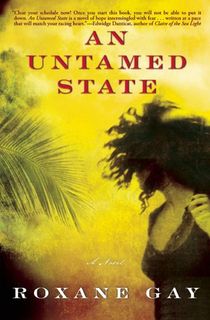
Want more memoirs? Sign up for the Early Bird Books newsletter and get the best daily ebook deals delivered straight to your inbox.
"My Dad Tried to Kill Me with an Alligator"
by Harrison Scott Key

- Photo Credit: Karl Bewick/Unsplash
Harrison Scott Key is the author of two memoirs: Congratulations, Who Are You Again? and The World’s Largest Man . Key details one humorous afternoon on Mississippi’s Pearl River, where he believes his brother’s “badass” antics and his father’s gruff and wild nature almost led to his death-by-alligator. Through a consideration of the differences between him and his father, he contemplates how his near-death experience might have shaped his adult life. Remembering his father fondly, Key reconsiders his own path of fatherhood.
Related: 10 Moving Biographies and Memoirs
"Explicit Violence"
by Lidia Yuknavitch
Known for her provocative novels Dora: A Headcase , The Small Backs of Children , and The Book of Joan , Lidia Yuknavitch wrote “Explicit Violence” about the terrible abuses she suffered throughout her lifetime. She talks not just of the physical acts, but the ways in which violence changed her state of mind. Yuknavitch is honest about the ways in which she was made to feel like she deserved the violence heaped upon her—and if how she didn’t deserve it, she should become the kind of person that might deserve it. With a sharp clarity, she condemns the ways in which those who suffer abuses, particularly women, are made to feel as though to talk about it is an inconvenience on those who could never understand.
For more from the life of Lidia Yuknavitch, she has also published the full-length memoir The Chronology of Water .
"Surviving Anxiety"
by Scott Stossel
In the essay “Surviving Anxiety,” journalist and author Scott Stossel opens up about his experience with mental illness. Suffering from anxiety since infancy, Stossel paints a startling and surprising picture of the measures he has to go through to appear unaffected and “normal” due to his internal (and often irrational) worries. In an honest detailing of therapeutic, medicinal, and self-medicinal attempts to get his high-functioning anxiety under control, he expresses the frustrations and constant battle those who suffer from mental illness experience. For a deeper look into Stossel’s experience and the history of anxiety, read his full-length memoir My Age of Anxiety .
"Darkness Visible"
by William Styron

- Photo Credit: Ian Espinosa/Unsplash
William Styron, acclaimed writer of Sophie’s Choice and The Confessions of Nat Turner , suffered deeply from bouts of depression. In his memoir essay, “Darkness Visible,” Styron is compelled to speak out about his struggle with mental illness after the suicide of Primo Levi. To combat the ignorance and taboo nature surrounding depression, Styron speaks about his own struggles with dark emotions, as well as the difficult path of healing. In the book of the same name, Styron expands upon this essay in a more complete memoir.
Related: William Styron: A Life in Books
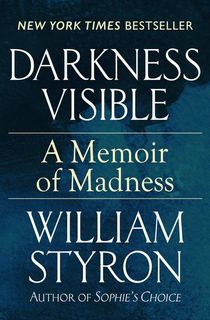
"No Labels, No Drama, Right?"
by Jordana Narin
This enlightening and insightful essay comes from Jordana Narin, the winner of the New York Times 2015 Modern Love College Essay contest. Her memoir account exemplifies how new relationships have changed in the modern era, often careening toward an amorphous understanding between two people. She touches on an inclination to avoid not only labels, but vulnerability. Narin outlines how in a situation where the feelings are no less profound than something “real,” people are putting obstacles in their own paths by embracing an aversion to emotional honesty.
"I Was Pregnant, and Then I Wasn't"
by Laura Turner

- Photo Credit: freestocks.org/Unsplash
Laura Turner is a journalist who has written for such publications as the New York Times , The Atlantic , Glamour , and The Verge , with a book in-progress about the cultural history of anxiety. In this tear-jerking short memoir, Turner talks about her recent experience with a miscarriage. Her account encapsulates the worries of burgeoning motherhood put at sudden odds with grief and an overwhelming feeling of suddenly being alone. In an especially poignant and candid moment, Turner writes, “Your life doesn’t change, and that’s the strange part—because it was supposed to.”
Related: 7 Tragic Memoirs That Deserve Your Tears
"After Life"
by Joan Didion
Following the death of her husband in 2003, renowned essayist, journalist, and author Joan Didion penned “After Life.” In her essay, Didion describes the moments leading up to her husband’s sudden death, and continues on in aching detail about the moments following her realization that he was gone. She describes her “waves” of grief which were at the same time both strange and typical, and reaches for an explanation of how different grief can be when it’s unexpected.
More of Didion’s profound writings include Slouching Toward Bethlehem , The White Album , and After Henry .
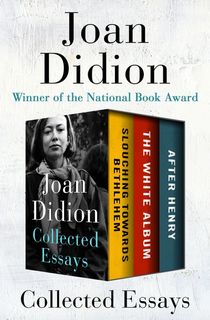
Fiction & Memoirs From 6 Influential Writers
Featured photo: Sincerely Media / Unsplash ; Additional images courtesy of Chris Karidis/ Unsplash ; Karl Bewick/ Unsplash ; Ian Espinosa/ Unsplash ; freestocks.org/ Unsplash

Get the best daily book deals delivered to your inbox
© 2024 OPEN ROAD MEDIA
- We are a participant in the Amazon Services LLC Associates Program, an affiliate advertising program designed to provide a means for us to earn fees by linking to Amazon.com and affiliated sites.
Home — Essay Types — Memoir Essay
Memoir Essay Examples
Selecting the right topic is the cornerstone of a compelling memoir essay. It's the initial step in crafting a narrative that resonates with readers and leaves a lasting impression. The chosen topic serves as the foundation upon which your entire memoir is built, setting the tone and direction for your storytelling journey. To better illustrate this point, let's examine some memoir essay examples in our base of essays.
When you carefully consider your memoir essay topics, you're essentially inviting readers into your world, allowing them to connect with your personal experiences, emotions, and insights. The more relatable the topic, the deeper the connection you can establish with your audience. After all, the power of memoir lies in its ability to evoke empathy and understanding.
To gain a better understanding of this concept, we can turn to some well-known memoirs, such as "The Glass Castle" by Jeannette Walls and "Eat, Pray, Love" by Elizabeth Gilbert, as memoir essay examples. "The Glass Castle" revolves around her unconventional upbringing and the struggles of her impoverished family, illustrating how the right topic can engage readers and make a memoir not just a personal narrative but a shared human experience.
Finding Inspiration for Memoir Essay Topics
So, where can you find inspiration for your memoir essay topics? The answer lies in your own life experiences, and there are countless facets to explore.
I. Start by reflecting on significant life events, such as your childhood memories. Think about the moments that shaped you, the adventures that left a lasting impression, and the challenges that forced you to grow. These events often hold the key to compelling memoir essay ideas, as they offer glimpses into your personal journey.
- A Life-Altering Event and Its Profound Impact
- Exploring the Impact of Milestones in Life
- Personal Crisis Leading to Transformation
- Influence of Key Moments on Life's Path
- Lessons from Milestones: Successes and Failures
II. Additionally, consider your milestones and achievements. Successes and accomplishments, both big and small, can be fertile ground for memoirs. Whether it's graduating from college, starting a business, or completing a marathon, these moments represent your growth and perseverance.
- Reflecting on the Marathon: Perseverance and Transformation
- Transitioning from College to the Real World
- Entrepreneurial Ventures: Navigating Challenges in Business
- Shaping Character Through Personal Achievement
- Personal Growth Through Accomplishments
Personal challenges and growth experiences also make for engaging topics. Everyone faces adversity at some point in their lives, and sharing how you navigated through these trials can inspire and connect with readers who have undergone similar struggles.
- My Journey Through Personal Challenges and Triumph
- Faced and Conquered: How I Overcame Life's Adversities
- Navigating Personal Struggles for Personal Growth
- Triumphing Over Life's Obstacles: Stories of Resilience
- Lessons from Adversity: Building Empathy and Connection Through Shared Struggles
Lastly, your career and professional experiences are a goldmine of stories. Share your successes, the challenges you've faced, and the valuable lessons you've learned along the way. Your career journey can offer valuable insights and inspiration to others pursuing their own professional paths.
- Lessons Learned from My Professional Journey
- My Career Success Story: From Novice to Expert
- Overcoming Challenges and Thriving in My Career
- Shaping Growth Through Career Path and Mentorship
- Inspiring Others with Insights from My Professional Odyssey
By delving into these various aspects of your life, you can uncover memoir topics that are not only deeply personal but also universally relatable, creating a narrative that resonates with readers on a profound level.
A memoir essay, with its vulnerability, introspection, and focus on key life lessons, differs from a standard personal essay or autobiography. Unlike chronological autobiographies, memoir essays thoughtfully reflect on specific meaningful experiences. By candidly revisiting impactful moments, memoir essayists gain self-awareness, find meaning in hardship, preserve family histories, and share life-changing epiphanies.
Great memoir essays , illustrated by memoir essay examples , balance vivid scenic recreation, raw emotional insights, and universal truths. Evocative sensory details transport readers to pivotal moments, while introspective narration reveals the inner turmoil, growth, and realizations that recollection brings. The most compelling memoirs extract wisdom from lived experience, inviting readers to reflect on their own journeys.
Memoir Essay’s Central Theme
Identifying your memoir essay’s central theme or message provides focus for both writing and reflection. Set aside time for deep thought about the big life moments you could explore within your memoir essay and what universal insights they hold.
Common memoir themes include overcoming adversity, grief and loss, achievement, parenthood, sexual identity, family dynamics, disillusionment, recovery from trauma or addiction, spiritual awakening, and more. For example, a parent’s memoir may center on personal growth through raising a special needs child. A memoir of grief could find meaning in love and legacy after loss.
Once you land on a specific theme, use it as a touchstone while shaping your memoir’s scenes, tone, and takeaways. Let it guide your writing toward impactful self-revelation.
Memoir Essay’s Structure
An intentional structure connects your memoir’s scenes into a cohesive narrative arc. Chronological organization works well for linear stories, while a braided narrative with interwoven timelines suits winding journeys.
Some memoirs, as in memoir essay examples for college students, utilize frame narratives that “bookend” the story, like Sidonie-Gabrielle Colette’s childhood recollections in My Mother’s House. Others divide chapters into thematic segments, like cancer survivor Kathy Kamen’s shifting outlooks in The Medicine Wheel.
Play with different structures until you find one that mirrors your narrative’s emotional cadence. Outline essential scenes like epiphanies, darkest moments, turning points, and resolutions to build your blueprint. A strong structure elevates your memoir’s impact.
Memoir Essay’s Voice and Tone
An authentic narrative voice and complementary tone shape how readers connect with your memoir. Your voice should fit the story, while your tone reflects the narrator’s perspective.
For example, a humorous, ironic tone could capture the absurdities of childhood. A somber, reflective tone may suit a memoir of loss. Word choice profoundly affects tone, so select descriptors deliberately based on the desired mood and emotions.
Beyond tone, stylistic devices like metaphor and imagery convey voice. Is your narrator contemplative? Sarcastic? Lyrics? Fragmented sentences or analytical asides also contribute nuance. Remember your voice makes the memoir uniquely yours.
Bringing Scenes and Characters to Life
Transport readers right into your memoir’s most pivotal scenes using vivid sensory description. Share sights, sounds, smells, textures, and tastes that set the scene and make it relatable. Zoom in on resonant images and telling details that reveal deeper meaning and character insight.
Dialogue and anecdotes also help dramatize events and portray relationships. Let important conversations and interactions unfold naturally to illuminate the interpersonal dynamics, motivations, and emotions at play. Specific, evocative details turn recalled moments into immersive scenes.
Polishing Memoir Essays
Refine your first draft by revisiting your memoir’s central theme and emotional impact. Strengthen the narrative arc and deepen insights through targeted revision:
- Read sections aloud to polish language and flow.
- Ask trusted readers for constructive feedback.
- Develop motifs and metaphors that underscore themes.
- Enhance scenes with more vivid sensory descriptions.
- Adjust structure and pacing as needed.
- Clarify the narrative perspective and voice.
Revision is key to crafting a memoir that resonates. It takes raw recollections and molds them into universally relatable experiences suffused with meaning.
Free Memoir Essay Examples
We hope these free memoir essay examples inspire you to embrace the power of storytelling and to celebrate the uniqueness of every life’s narrative. Explore the pages of these memoirs to witness the resilience of the human spirit, the complexities of relationships, and the transformative power of personal reflection. These examples of memoir essays are a testament to the richness of the human experience and the artistry of memoir writing.
College Memoir Essay Examples
These insightful essays provide a glimpse into the diverse and transformative experiences of college life. Explore these stories of growth, challenges, and self-discovery as students share their personal narratives, shedding light on the unique journey that is higher education. Whether you’re a student seeking inspiration or simply curious about the college experience, these essays offer valuable insights and perspectives.
How to Write a Memoir Essays
Tips in memoir essay infographics.
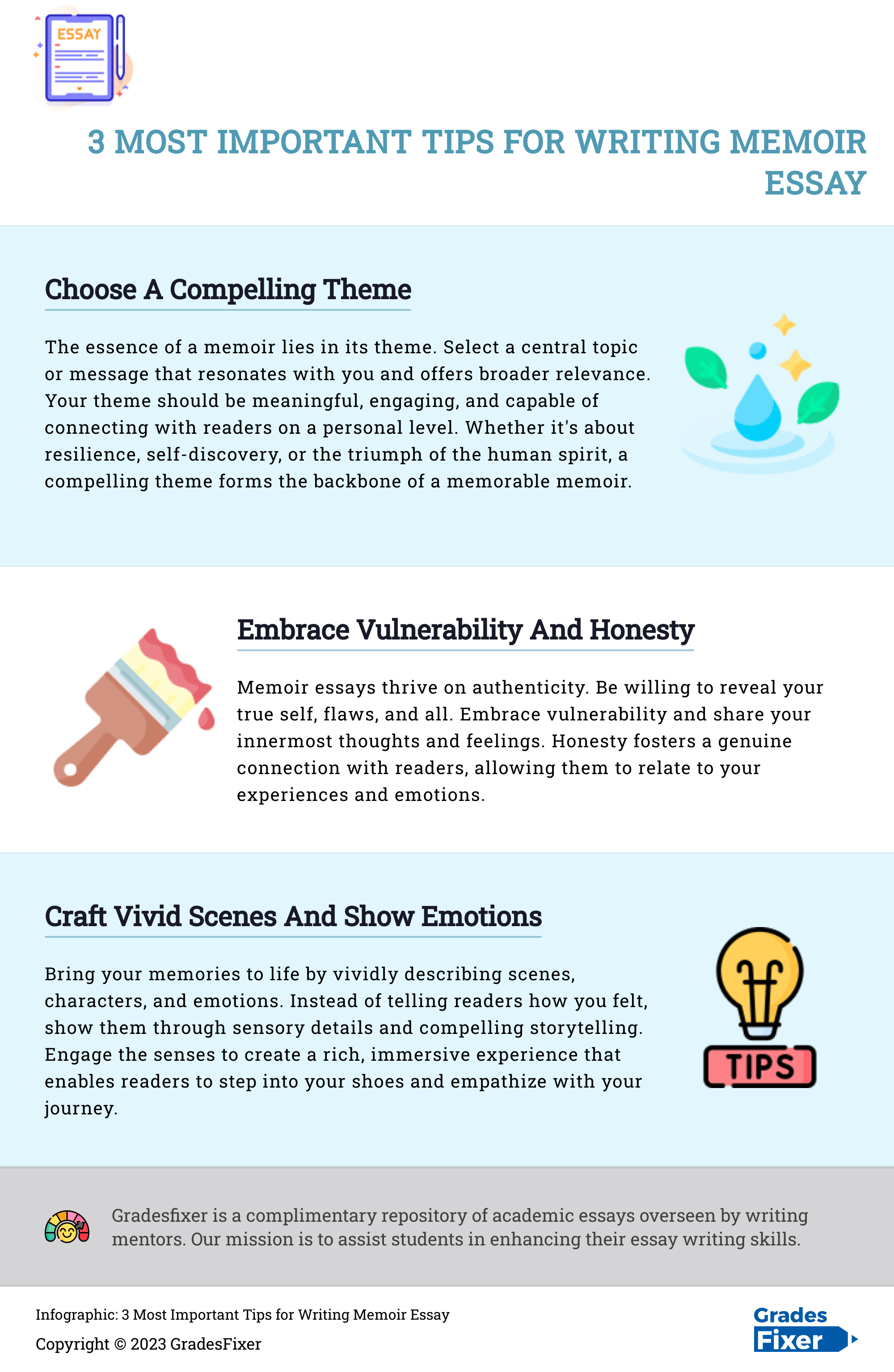
Checklist for Writing a Memoir Essay
- Before You Start
✓ Choose a Specific Topic: select a meaningful and impactful life experience to write about.
✓ Identify Your Message: determine the central theme or message you want to convey through your memoir essay.
✓ Gather Memories: brainstorm and collect memories, details, and emotions related to your chosen experience.
✓ Narrow Your Focus: decide on the specific aspect or moment within your experience that you’ll explore in-depth.
- Structuring Your Memoir Essay
✓ Create a Three-Part Structure: plan for a clear beginning, middle, and end in your essay.
✓ Craft an Engaging Introduction: start with a compelling hook that introduces the topic and grabs the reader’s attention.
✓ Develop the Body: explore your chosen experience in detail, utilizing vivid descriptions, emotions, and reflections.
✓ Conclude Thoughtfully: wrap up your essay by tying together loose ends and leaving readers with something to ponder.
✓ Reflect and Connect: consider the broader implications of your memoir, connecting your personal experience to universal truths or lessons.
- Writing Your Memoir Essay
✓ Write Clearly and Concisely: use clear and concise language to convey your story and message effectively.
✓ Use Sensory Details: incorporate sensory details to bring your experiences to life for the reader.
✓ Be Honest and Authentic: share both strengths and vulnerabilities to make your memoir more relatable and authentic.
✓ Embrace Vulnerability: don’t shy away from sharing your emotions and vulnerabilities, as they add depth to your narrative.
✓ Revise and Edit: carefully revise and edit your work for clarity, coherence, and overall polish.
- Additional Resources
✓ Refer to Memoir Examples for College Students: seek inspiration and guidance from memoir examples tailored to college students’ experiences.
✓ Explore how to start a memoir essay examples: study various ways to begin your memoir essay effectively, drawing from examples.
Using this checklist can help you stay organized and focused while writing your memoir essay, ensuring that you craft a compelling and meaningful narrative.
Figurative Language Memoir
Throughout history, figurative language has been used as a powerful tool for writers to convey complex emotions and ideas in a more engaging and impactful way. From the use of metaphors to similes, personification, and hyperbole, figurative language adds depth and creativity to writing, allowing…
The Power of Traveling: Personal Experiences and Reflections
Introduction Traveling is one of the most enriching experiences one can have. It exposes you to new cultures, customs, and ways of thinking. However, it can also be challenging and unpredictable, making it a true adventure. As a college student, I have had the opportunity…
The Transformative Power of Literacy
Literacy, in its simplest definition, is the ability to read and write. However, it is much more than that. Literacy is a fundamental skill that enables individuals to communicate, comprehend, and learn. It is an essential tool for success in life and is the foundation…
The Significance of Family: A Memoir Paper
Introduction Families are the cornerstone of society. They provide love, support, and guidance to their members, helping them navigate the ups and downs of life. Each family has its unique story to tell, shaped by the experiences they share together. As a college student, I…
Get professional help in 5 minutes

Lessons Learned from Childhood, College, and Long-Distance Connections
Friendship is a fundamental aspect of human life. This memoir reflects on the author’s experiences with childhood friends, college friends, and long-distance friendships, highlighting the lessons learned and the power of friendship in overcoming life’s challenges. Childhood Friends Childhood friends are often the first friends…
Preserving Family Culinary Traditions: A Connection to My Cultural Roots
Food is an essential part of our culture and identity, and it plays a significant role in shaping our family traditions. Growing up, my family’s kitchen was always filled with the smells of delicious home-cooked meals, and the recipes that have been passed down through…
My Journey as a Syrian Refugee: Shedding Light on the Realities of the Crisis
With over 80 million people forcibly displaced from their homes. Syria has been at the forefront of this crisis, with millions of Syrians fleeing the country due to the ongoing civil war. As a Syrian refugee myself, I have experienced the challenges and obstacles that…
Life Experiences: Shaping My Identity
Life is a journey filled with twists and turns that shape who we are today. Our past experiences, both good and bad, have a profound impact on our lives and help us grow into the person we are today. As a college student, I have…
Journey of Self-Discovery through Memoirs
Introduction Memoirs are a powerful tool for self-discovery. They allow individuals to reflect on their past experiences and use them to gain a better understanding of themselves. In this essay, I will be sharing my personal journey of self-discovery through my memoir. I hope that…
From Struggles to Success: My Journey
Introduction Life is a journey full of twists and turns, ups and downs. My journey has been no exception. Growing up, I faced many challenges that tested my resilience and strength. However, through hard work and determination, I was able to overcome these struggles and…
What is a memoir essay?
This type of writing is often mixed up with autobiography essays. However, it is not the same as it represents a first-person narrative that describes a certain part of a person's life. The topics and ideas are always chosen by the author. In terms of comparing a personal essay vs memoir, it is necessary to understand that memoir still keeps to a certain chronology even if describing a single day.
How to write memoir essays?
Even though it is not a fiction story, memoir essay writing still uses various metaphors or literary devices that increase an emotional effect. You can see our memoir essay examples that show how it is done in practice. The structure has a strong temporal effect and an overly emotional tone, which is acceptable for memoir writing. Remember to end your writing with an important argumentation that will make readers think.
How to start writing a memoir essay?
To begin writing a memoir essay, start by identifying a compelling personal story or theme from your life. Reflect on its significance and outline the key moments. Then, create an engaging opening that hooks readers, drawing them into your narrative. Finally, let your story unfold with honesty, reflection, and vivid detail.
How to write a memoir essay structure?
A memoir essay typically follows a chronological or thematic structure. Start with an engaging introduction, introduce the central theme or event, and provide vivid details. Progress through the narrative, building tension or insight. Conclude by reflecting on the significance of your story, offering lessons, or leaving readers with a thought-provoking idea.
How does a memoir essay differ from other types of writing?
Memoir essays differ by their introspective nature, centering on personal experiences and lessons learned. They often incorporate vivid descriptions and emotional depth to engage readers on a personal level.
What are some common themes explored in memoir essays?
Common memoir themes include overcoming adversity, family dynamics, personal growth, grief, identity, and transformative moments. These themes provide a framework for exploring life's complexities.
What is the ultimate goal of a memoir essay?
The primary goal of a memoir essay is to share a personal story while offering universal insights or lessons that resonate with readers. It aims to create a meaningful and reflective narrative.
How much personal detail should I include?
Be judiciously vulnerable. Share telling details that lend insight, but avoid oversharing or exposing others’ privacy. Strive for candid self-revelation in service of the larger theme.
How do I conclude in a meaningful way?
Offer closing reflections on your memoir’s central insights, tying together the theme and narrative arc. Look ahead to the future or revisit where the journey began. End on an uplifting or poignant note.
Students also browse
- Research Essay
- Proposal Essay
- Analytical Essay
- Argumentative Essay
- Personal Narrative Essay
- Problem Solution Essay
- Persuasive Essay
- Exemplification Essays
- Cause and Effect Essays
- Synthesis Essay
We use cookies to personalyze your web-site experience. By continuing we’ll assume you board with our cookie policy .
- Instructions Followed To The Letter
- Deadlines Met At Every Stage
- Unique And Plagiarism Free
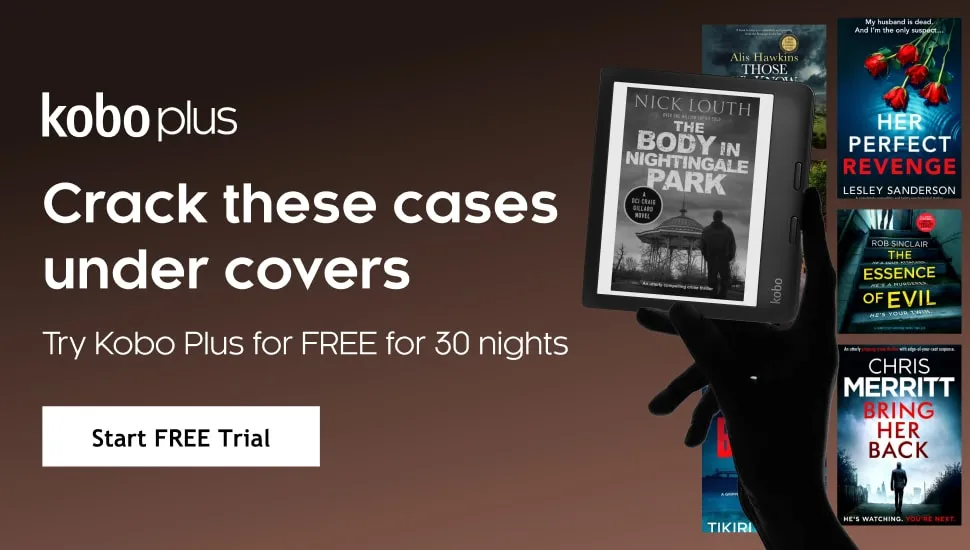
25 Great Nonfiction Essays You Can Read Online for Free
Alison Doherty
Alison Doherty is a writing teacher and part time assistant professor living in Brooklyn, New York. She has an MFA from The New School in writing for children and teenagers. She loves writing about books on the Internet, listening to audiobooks on the subway, and reading anything with a twisty plot or a happily ever after.
View All posts by Alison Doherty
I love reading books of nonfiction essays and memoirs , but sometimes have a hard time committing to a whole book. This is especially true if I don’t know the author. But reading nonfiction essays online is a quick way to learn which authors you like. Also, reading nonfiction essays can help you learn more about different topics and experiences.
Besides essays on Book Riot, I love looking for essays on The New Yorker , The Atlantic , The Rumpus , and Electric Literature . But there are great nonfiction essays available for free all over the Internet. From contemporary to classic writers and personal essays to researched ones—here are 25 of my favorite nonfiction essays you can read today.

“Beware of Feminist Lite” by Chimamanda Ngozi Adichie
The author of We Should All Be Feminists writes a short essay explaining the danger of believing men and woman are equal only under certain conditions.
“It’s Silly to Be Frightened of Being Dead” by Diana Athill
A 96-year-old woman discusses her shifting attitude towards death from her childhood in the 1920s when death was a taboo subject, to World War 2 until the present day.
“Letter from a Region in my Mind” by James Baldwin
There are many moving and important essays by James Baldwin . This one uses the lens of religion to explore the Black American experience and sexuality. Baldwin describes his move from being a teenage preacher to not believing in god. Then he recounts his meeting with the prominent Nation of Islam member Elijah Muhammad.
“Relations” by Eula Biss
Biss uses the story of a white woman giving birth to a Black baby that was mistakenly implanted during a fertility treatment to explore racial identities and segregation in society as a whole and in her own interracial family.
“Friday Night Lights” by Buzz Bissinger
A comprehensive deep dive into the world of high school football in a small West Texas town.
“The Case for Reparations” by Ta-Nehisi Coates
Coates examines the lingering and continuing affects of slavery on American society and makes a compelling case for the descendants of slaves being offered reparations from the government.
“Why I Write” by Joan Didion
This is one of the most iconic nonfiction essays about writing. Didion describes the reasons she became a writer, her process, and her journey to doing what she loves professionally.
“Go Gentle Into That Good Night” by Roger Ebert
With knowledge of his own death, the famous film critic ponders questions of mortality while also giving readers a pep talk for how to embrace life fully.
“My Mother’s Tongue” by Zavi Kang Engles
In this personal essay, Engles celebrates the close relationship she had with her mother and laments losing her Korean fluency.
“My Life as an Heiress” by Nora Ephron
As she’s writing an important script, Ephron imagines her life as a newly wealthy woman when she finds out an uncle left her an inheritance. But she doesn’t know exactly what that inheritance is.
“My FatheR Spent 30 Years in Prison. Now He’s Out.” by Ashley C. Ford
Ford describes the experience of getting to know her father after he’s been in prison for almost all of her life. Bridging the distance in their knowledge of technology becomes a significant—and at times humorous—step in rebuilding their relationship.
“Bad Feminist” by Roxane Gay
There’s a reason Gay named her bestselling essay collection after this story. It’s a witty, sharp, and relatable look at what it means to call yourself a feminist.
“The Empathy Exams” by Leslie Jamison
Jamison discusses her job as a medical actor helping to train medical students to improve their empathy and uses this frame to tell the story of one winter in college when she had an abortion and heart surgery.
“What I Learned from a Fitting Room Disaster About Clothes and Life” by Scaachi Koul
One woman describes her history with difficult fitting room experiences culminating in one catastrophe that will change the way she hopes to identify herself through clothes.
“Breasts: the Odd Couple” by Una LaMarche
LaMarche examines her changing feelings about her own differently sized breasts.
“How I Broke, and Botched, the Brandon Teena Story” by Donna Minkowitz
A journalist looks back at her own biased reporting on a news story about the sexual assault and murder of a trans man in 1993. Minkowitz examines how ideas of gender and sexuality have changed since she reported the story, along with how her own lesbian identity influenced her opinions about the crime.
“Politics and the English Language” by George Orwell
In this famous essay, Orwell bemoans how politics have corrupted the English language by making it more vague, confusing, and boring.
“Letting Go” by David Sedaris
The famously funny personal essay author , writes about a distinctly unfunny topic of tobacco addiction and his own journey as a smoker. It is (predictably) hilarious.
“Joy” by Zadie Smith
Smith explores the difference between pleasure and joy by closely examining moments of both, including eating a delicious egg sandwich, taking drugs at a concert, and falling in love.
“Mother Tongue” by Amy Tan
Tan tells the story of how her mother’s way of speaking English as an immigrant from China changed the way people viewed her intelligence.
“Consider the Lobster” by David Foster Wallace
The prolific nonfiction essay and fiction writer travels to the Maine Lobster Festival to write a piece for Gourmet Magazine. With his signature footnotes, Wallace turns this experience into a deep exploration on what constitutes consciousness.
“I Am Not Pocahontas” by Elissa Washuta
Washuta looks at her own contemporary Native American identity through the lens of stereotypical depictions from 1990s films.
“Once More to the Lake” by E.B. White
E.B. White didn’t just write books like Charlotte’s Web and The Elements of Style . He also was a brilliant essayist. This nature essay explores the theme of fatherhood against the backdrop of a lake within the forests of Maine.
“Pell-Mell” by Tom Wolfe
The inventor of “new journalism” writes about the creation of an American idea by telling the story of Thomas Jefferson snubbing a European Ambassador.
“The Death of the Moth” by Virginia Woolf
In this nonfiction essay, Wolf describes a moth dying on her window pane. She uses the story as a way to ruminate on the lager theme of the meaning of life and death.

You Might Also Like


16 memorable memoirs told in essays, stories, and snapshots
- BY Anne Bogel
- IN Audiobook , Book Lists , Books & Reading
- 40 Comments | Comment

When I’m not sure what to read next, I often turn to memoir. My own reading habits skew towards fiction, and a good memoir allows me to read nonfiction that is still driven by story, in much the same way a good novel is.
In recent years, I’ve noticed the rise of memoir-in-essays, as well as memoirs that play with the format in interesting ways. ( You know I’m a total nerd when it comes to format and structure, right ? ) A bonus: memoirs told in essays, stories, and snapshots are a great option for anyone dealing with a short attention span, something I admit to struggling with these days.
With books like these, you can read one essay or short chapter at a time or gobble them down in one sitting. The memoirs featured here run the gamut of emotions, from funny and light to poignant and serious. I hope you’ll find a few attractive options for your every reading mood.
We’ve included one graphic memoir; if you’re interested in more along those lines, be sure to check out WSIRN producer Brenna Frederick’s recommendations in Patreon Bonus Episode #79: Comics and graphic novels for the curious . As if that’s not enough, team member Shannan Malone shared the memoirs that changed her life in this Patreon bonus episode .
A special note for audiobook fans: I love listening to memoirs, especially when the author reads their own story. Many of these are fantastic in that format.
Some links (including all Amazon links) are affiliate links. More details here .
16 well-crafted memoirs to read in small bites or one sitting

Soldier: A Poet’s Childhood

I Am, I Am, I Am

My Southern Journey: True Stories from the Heart of the South

Tell Me More: Stories About the 12 Hardest Things I’m Learning to Say

I Miss You When I Blink: Essays

Black Is the Body: Stories from My Grandmother’s Time, My Mother’s Time, and Mine

Here for It: Or How to Save Your Soul in America

Let’s Pretend This Never Happened: (A Mostly True Memoir)

Good Talk: A Memoir in Conversations

84, Charing Cross Road

Nobody Will Tell You This But Me: A true (as told to me) story

Stories I Only Tell My Friends

We’re Going to Need More Wine: Stories That Are Funny, Complicated, and True

Born a Crime: Stories from a South African Childhood

Seeing Ghosts: A Memoir

Heating & Cooling: 52 Micro-Memoirs
Do you have any uniquely structured memoirs to add to this list? Tell us in the comments!
P.S. Enjoy these 20 travel memoirs to take you around the world and 20 tasty and tantalizing food memoirs to inspire your culinary pursuits.
P.P.S. Find an exclusive list of my favorite autobiography, biography, and memoirs in My Reading Life: A Book Journal , available in bookstores near you!

40 comments
This is how I structured my books. I think writing so many sermons trained my brain to think in discrete chapters. Sermons are, after all, kind of a cousin of essays.
I love so many of the books you listed here and will add others to my to-read list.
I am currently reading an Australian memoir, Sandra Hogan’s With My Little Eye, and my book club’s choice for November is Cicely Tyson’s memoir, Just As I Am.
My all time favorite book is a memoir. It is in epistolary format, letters to males in the authors life. Some she has meet, some have impacted her even though she never laid eyes on them or knew their names. I have read this book seven times, and can easily see myself reading it seven more. Beautifully written, almost like poetry Mary-Louise Parker’s Dear Mr. You is an amazing book.
That sounds good! I am placing it at the top of my TBR list.
I love all things Jenny Lawson and Let’s Pretend this Never Happened is a great introduction to her. I really love her second memoir, Furiously Happy, in which she delves a little deeper into her struggles with autoimmune disease and mental health.
I loved Amy Krouse Rosenthal’s memoirs, Encyclopedia of an Ordinary Life and Textbook Amy Krouse Rosenthal, both of which are structured in unusual and captivating ways using text, art, and variations on formatting that give the reader a clear sense of how creative, quirky, and lovely Amy was.
Yes! Amy Krouse Rosenthal is my favorite author. Her memoir is definitely uniquely structured. I bought the blank encyclopedia of me. I’ve always wanted to journal but the blank pages overwhelmed me. Amy’s format gave me courage! I am so glad you thought to add it to the list. I miss her, don’t you?
I came to comment the same thing! Textbook Amy Krouse Rosenthal is the most unique thing I’ve ever read: she’s clever and warm and so genuinely unique. I just read it for a second time.
I love the Rick Bragg book! Any of his books read on audio by him is fantastic! I read 84, Charing Cross Road a long time ago and I still remember the feeling I had as the main characters forge a friendship an ocean away through pen and ink and anticipation awaiting correspondence.
Our book club read Belonging (by Nora Krug, https://nora-krug.com/belonging-heimat ), which is a graphic memoir. I loved the way she intertwined a variety of illustration types with the story.
Born a Crime–an absolute MUST on audio! And Tell Me More…oh, my. One bit of advice: don’t do what I did! I listened on a flight. Muffled sobs…tiny airplane napkins (sad excuse for a hanky).
To this list, I would add Maggie Smith’s Keep Moving: Notes on Loss, Creativity, and Change. I also love May Sarton’s journals.
This is my favorite genre!!! All of Kelly Corrigan’s books are perfection. Kate Bowler’s Everything Happens For A Reason: And Other Lies I’ve Loved, and her just published No Cure for Being Human are both stunning! Nora McInerny’s It’s OK to Laugh(Crying is Cool Too) is also great. On the lighter side, Carrie Fisher’s Wishful Drinking never fails to make me laugh, and Leslie Jordan’s How Y’all Doin’? On audiobook in his distinctive voice is a delight:)
I loved Born a Crime. I listened to it on audio as read by the author. Fantastic! Thanks for the Rick Bragg recommendation. I recently finished his All Over but the Shoutin’. Excellent. That book had me smitten from chapter 1, page 1.
Persepolis and mouse
Unbroken by Laura Hillenbrand
I guess Unbroken probably isn’t a memoir. Sorry.
I nominate John Green’s The Anthropocene Reviewed, which doesn’t sound like a memoir but very much is. The audio version, which he narrates, is especially wonderful.
I love Funny in Farsi: A Memoir of Growing Up Iranian in America by Firoozeh Dumas. The vignette structure appeals to me and she makes me laugh! I haven’t yet read her follow-up memoir, Laughing Without an Accent: Adventures of an Iranian American, at Home and Abroad, but I’d expect another stellar read.
This was such a great list. A lot to add to my TBR list. Thanks for the brief, but descriptive reviews.
I recommend El Deafo told in graphic form. I loved it
El Deafo is fantastic! I also loved Ordinary Hazards by Nikki Grimes–a memoir in verse that is beautiful, breathtaking, and bittersweet (warning: some sexual abuse). Dear Exile by Hilary Liftin and Kate Montgomery is a dual memoir told through letters (sort of like 84 Charing Cross). One of the women is in Africa, serving in the Peace Corps for a year, and the other is in New York City. Fascinating and one I’ve read several times.
I’ve just started “London’s Number One Dog-Walking Agency” by Kate McDougall. Very charming so far!
I read Rick Bragg’s this past year and loved it.
The Bright Hour. Achingly honest telling of Nina Riggs end of life – she lives each day lovingly and doesn’t lose her passion or humor.
Highly recommend I Am I Am I Am by Maggie O’Farrell. Every chapter is her wonderful, extraordinary, rich prose. She has lived an amazingly different life and the talent to write so well about it.
If you liked Rob Lowe’s book, you will like Mathew McConaughney’s book, Greenlights. He narrates and is a great story teller. He too had an interesting childhood & outlook on life.
I just want to comment that lately, when I try to click on the link in the email, to go to Modernmrsdarcy.com for one of these blog articles—- on both my android tablet and my iPad I get “Security Risk” and it won’t go there. On my computer it’s fine. Is it just me, or has anybody else had this issue?
I have had the same security issue on my tablet. Doesn’t do this unless I click on the link in a email to take me to the blog.
Thanks for letting me know. We’re investigating why this warning occasionally pops up.
I really did enjoy I Miss You When I Blink, and I’m not one for a book of essays! But what about these excellent ones? My Family and Other Animals by Gerald Durrell The Life and Times of the Thunderbolt Kid by Bill Bryson When We Were the Kennedys by Monica Wood Four Seasons in Rome, by Anthony Doerr Lunch in Paris and Picnic in Provence, by Elizabeth Bard The Olive Farm, by Carol Drinkwater My Life in France, by Julia Child Animals in Translation, by Temple Grandin and Here if You Need Me, by Kate Braestrup
I’ve read or purchased many of these based on your recommendations from the podcast. Every one I’ve read, I’ve loved. Thanks for sharing these!
The style you’re talking about is creative non-fiction, defined as “true stories, well told.” For anyone interested in writing their own memoir in this style, I highly recommend “Fifty-Two Snapshots: A Memoir Starter Kit” by Sonja Livingston. Her book, “Ghostbread,” is a stellar example of this style and is about her childhood in upstate New York.
Just ordered fifty two snapshots. Thank you.
Ree Drummond’s Frontier Follies made me laugh so hard that I cried! It was a book that was hard to put down. She is smart, witty, and tells about a life unlike most. Highly recommend!
I just finished I’m Just Happy to Be Here by Janelle Hanchett and loved it! Its addiction memoir meets truth-telling mommy blogger.
Does Crying in H Mart count? I listened on audio, so it was hard to tell if is was written in essays, or just narrative.
And I read the egalley, and the formatting isn’t always the best on those. I’m inclined to count it, and regardless, I thought it was incredible.
Brown Girl Dreaming is Jacqueline Woodson’s memoir told in verse. It’s lovely.
Found this older list while looking for memoirs. Very helpful! I recommend The Beastie Boy Book, which is a memoir of the surviving Beastie Boys, written in essays, playlists, recipes, etc. I read it more for the 1980s NYC stories than because I am a big Beastie Boys fan, and I was surprised by how much I loved the whole thing! It’s really fun book.
i would highly recommend Grace Notes by Brian Doyle. It made me cry and laugh.
Leave a Comment Cancel reply
Your email address will not be published. Required fields are marked *

Modern Mrs Darcy® participates in affiliate marketing programs, where we receive a small commission when products are purchased through links on the site. We have an affiliate relationship with the following retailers: Amazon Services LLC Associates Program, Bookshop, Libro.fm, Target.com, and others. We appreciate it so much when you support Modern Mrs Darcy® by clicking on these links to make your purchases.
© 2023 Anne Bogel | Website by Contemplate Design
Find your next read with:
100 book recommendations for every mood.
Plus weekly emails with book lists, reading life tips, and links to delight avid readers.

If you’ve thought about putting your life to the page, you may have wondered how to write a memoir. We start the road to writing a memoir when we realize that a story in our lives demands to be told. As Maya Angelou once wrote, “There is no greater agony than bearing an untold story inside you.”
How to write a memoir? At first glance, it looks easy enough—easier, in any case, than writing fiction. After all, there is no need to make up a story or characters, and the protagonist is none other than you.
Still, memoir writing carries its own unique challenges, as well as unique possibilities that only come from telling your own true story. Let’s dive into how to write a memoir by looking closely at the craft of memoir writing, starting with a key question: exactly what is a memoir?
How to Write a Memoir: Contents
What is a Memoir?
- Memoir vs Autobiography
Memoir Examples
Short memoir examples.
- How to Write a Memoir: A Step-by-Step Guide
A memoir is a branch of creative nonfiction , a genre defined by the writer Lee Gutkind as “true stories, well told.” The etymology of the word “memoir,” which comes to us from the French, tells us of the human urge to put experience to paper, to remember. Indeed, a memoir is “ something written to be kept in mind .”
A memoir is defined by Lee Gutkind as “true stories, well told.”
For a piece of writing to be called a memoir, it has to be:
- Nonfictional
- Based on the raw material of your life and your memories
- Written from your personal perspective
At this point, memoirs are beginning to sound an awful lot like autobiographies. However, a quick comparison of Elizabeth Gilbert’s Eat, Pray, Love , and The Autobiography of Benjamin Franklin , for example, tells us that memoirs and autobiographies could not be more distinct.
Next, let’s look at the characteristics of a memoir and what sets memoirs and autobiographies apart. Discussing memoir vs. autobiography will not only reveal crucial insights into the process of writing a memoir, but also help us to refine our answer to the question, “What is a memoir?”
Memoir vs. Autobiography
While both use personal life as writing material, there are five key differences between memoir and autobiography:
1. Structure
Since autobiographies tell the comprehensive story of one’s life, they are more or less chronological. writing a memoir, however, involves carefully curating a list of personal experiences to serve a larger idea or story, such as grief, coming-of-age, and self-discovery. As such, memoirs do not have to unfold in chronological order.
While autobiographies attempt to provide a comprehensive account, memoirs focus only on specific periods in the writer’s life. The difference between autobiographies and memoirs can be likened to that between a CV and a one-page resume, which includes only select experiences.
The difference between autobiographies and memoirs can be likened to that between a CV and a one-page resume, which includes only select experiences.
Autobiographies prioritize events; memoirs prioritize the writer’s personal experience of those events. Experience includes not just the event you might have undergone, but also your feelings, thoughts, and reflections. Memoir’s insistence on experience allows the writer to go beyond the expectations of formal writing. This means that memoirists can also use fiction-writing techniques , such as scene-setting and dialogue , to capture their stories with flair.
4. Philosophy
Another key difference between the two genres stems from the autobiography’s emphasis on facts and the memoir’s reliance on memory. Due to memory’s unreliability, memoirs ask the reader to focus less on facts and more on emotional truth. In addition, memoir writers often work the fallibility of memory into the narrative itself by directly questioning the accuracy of their own memories.
Memoirs ask the reader to focus less on facts and more on emotional truth.
5. Audience
While readers pick up autobiographies to learn about prominent individuals, they read memoirs to experience a story built around specific themes . Memoirs, as such, tend to be more relatable, personal, and intimate. Really, what this means is that memoirs can be written by anybody!
Ready to be inspired yet? Let’s now turn to some memoir examples that have received widespread recognition and captured our imaginations!
If you’re looking to lose yourself in a book, the following memoir examples are great places to begin:
- The Year of Magical Thinking , which chronicles Joan Didion’s year of mourning her husband’s death, is certainly one of the most powerful books on grief. Written in two short months, Didion’s prose is urgent yet lucid, compelling from the first page to the last. A few years later, the writer would publish Blue Nights , another devastating account of grief, only this time she would be mourning her daughter.
- Patti Smith’s Just Kids is a classic coming-of-age memoir that follows the author’s move to New York and her romance and friendship with the artist Robert Maplethorpe. In its pages, Smith captures the energy of downtown New York in the late sixties and seventies effortlessly.
- When Breath Becomes Air begins when Paul Kalanithi, a young neurosurgeon, is diagnosed with terminal cancer. Exquisite and poignant, this memoir grapples with some of the most difficult human experiences, including fatherhood, mortality, and the search for meaning.
- A memoir of relationship abuse, Carmen Maria Machado’s In the Dream House is candid and innovative in form. Machado writes about thorny and turbulent subjects with clarity, even wit. While intensely personal, In the Dream House is also one of most insightful pieces of cultural criticism.
- Twenty-five years after leaving for Canada, Michael Ondaatje returns to his native Sri Lanka to sort out his family’s past. The result is Running in the Family , the writer’s dazzling attempt to reconstruct fragments of experiences and family legends into a portrait of his parents’ and grandparents’ lives. (Importantly, Running in the Family was sold to readers as a fictional memoir; its explicit acknowledgement of fictionalization prevented it from encountering the kind of backlash that James Frey would receive for fabricating key facts in A Million Little Pieces , which he had sold as a memoir . )
- Of the many memoirs published in recent years, Tara Westover’s Educated is perhaps one of the most internationally-recognized. A story about the struggle for self-determination, Educated recounts the writer’s childhood in a survivalist family and her subsequent attempts to make a life for herself. All in all, powerful, thought-provoking, and near impossible to put down.
While book-length memoirs are engaging reads, the prospect of writing a whole book can be intimidating. Fortunately, there are plenty of short, essay-length memoir examples that are just as compelling.
While memoirists often write book-length works, you might also consider writing a memoir that’s essay-length. Here are some short memoir examples that tell complete, lived stories, in far fewer words:
- “ The Book of My Life ” offers a portrait of a professor that the writer, Aleksandar Hemon, once had as a child in communist Sarajevo. This memoir was collected into Hemon’s The Book of My Lives , a collection of essays about the writer’s personal history in wartime Yugoslavia and subsequent move to the US.
- “The first time I cheated on my husband, my mother had been dead for exactly one week.” So begins Cheryl Strayed’s “ The Love of My Life ,” an essay that the writer eventually expanded into the best-selling memoir, Wild: From Lost to Found on the Pacific Crest Trail .
- In “ What We Hunger For ,” Roxane Gay weaves personal experience and a discussion of The Hunger Games into a powerful meditation on strength, trauma, and hope. “What We Hunger For” can also be found in Gay’s essay collection, Bad Feminist .
- A humorous memoir structured around David Sedaris and his family’s memories of pets, “ The Youth in Asia ” is ultimately a story about grief, mortality and loss. This essay is excerpted from the memoir Me Talk Pretty One Day , and a recorded version can be found here .
So far, we’ve 1) answered the question “What is a memoir?” 2) discussed differences between memoirs vs. autobiographies, 3) taken a closer look at book- and essay-length memoir examples. Next, we’ll turn the question of how to write a memoir.
How to Write a Memoir: A-Step-by-Step Guide
1. how to write a memoir: generate memoir ideas.
how to start a memoir? As with anything, starting is the hardest. If you’ve yet to decide what to write about, check out the “ I Remember ” writing prompt. Inspired by Joe Brainard’s memoir I Remember , this prompt is a great way to generate a list of memories. From there, choose one memory that feels the most emotionally charged and begin writing your memoir. It’s that simple! If you’re in need of more prompts, our Facebook group is also a great resource.
2. How to Write a Memoir: Begin drafting
My most effective advice is to resist the urge to start from “the beginning.” Instead, begin with the event that you can’t stop thinking about, or with the detail that, for some reason, just sticks. The key to drafting is gaining momentum . Beginning with an emotionally charged event or detail gives us the drive we need to start writing.
3. How to Write a Memoir: Aim for a “ shitty first draft ”
Now that you have momentum, maintain it. Attempting to perfect your language as you draft makes it difficult to maintain our impulses to write. It can also create self-doubt and writers’ block. Remember that most, if not all, writers, no matter how famous, write shitty first drafts.
Attempting to perfect your language as you draft makes it difficult to maintain our impulses to write.
4. How to Write a Memoir: Set your draft aside
Once you have a first draft, set it aside and fight the urge to read it for at least a week. Stephen King recommends sticking first drafts in your drawer for at least six weeks. This period allows writers to develop the critical distance we need to revise and edit the draft that we’ve worked so hard to write.
5. How to Write a Memoir: Reread your draft
While reading your draft, note what works and what doesn’t, then make a revision plan. While rereading, ask yourself:
- What’s underdeveloped, and what’s superfluous.
- Does the structure work?
- What story are you telling?
6. How to Write a Memoir: Revise your memoir and repeat steps 4 & 5 until satisfied
Every piece of good writing is the product of a series of rigorous revisions. Depending on what kind of writer you are and how you define a draft,” you may need three, seven, or perhaps even ten drafts. There’s no “magic number” of drafts to aim for, so trust your intuition. Many writers say that a story is never, truly done; there only comes a point when they’re finished with it. If you find yourself stuck in the revision process, get a fresh pair of eyes to look at your writing.
7. How to Write a Memoir: Edit, edit, edit!
Once you’re satisfied with the story, begin to edit the finer things (e.g. language, metaphor , and details). Clean up your word choice and omit needless words , and check to make sure you haven’t made any of these common writing mistakes . Be sure to also know the difference between revising and editing —you’ll be doing both. Then, once your memoir is ready, send it out !
Learn How to Write a Memoir at Writers.com
Writing a memoir for the first time can be intimidating. But, keep in mind that anyone can learn how to write a memoir. Trust the value of your own experiences: it’s not about the stories you tell, but how you tell them. Most importantly, don’t give up!
Anyone can learn how to write a memoir.
If you’re looking for additional feedback, as well as additional instruction on how to write a memoir, check out our schedule of nonfiction classes . Now, get started writing your memoir!
25 Comments
Thank you for this website. It’s very engaging. I have been writing a memoir for over three years, somewhat haphazardly, based on the first half of my life and its encounters with ignorance (religious restrictions, alcohol, and inability to reach out for help). Three cities were involved: Boston as a youngster growing up and going to college, then Washington DC and Chicago North Shore as a married woman with four children. I am satisfied with some chapters and not with others. Editing exposes repetition and hopefully discards boring excess. Reaching for something better is always worth the struggle. I am 90, continue to be a recital pianist, a portrait painter, and a writer. Hubby has been dead for nine years. Together we lept a few of life’s chasms and I still miss him. But so far, my occupations keep my brain working fairly well, especially since I don’t smoke or drink (for the past 50 years).
Hi Mary Ellen,
It sounds like a fantastic life for a memoir! Thank you for sharing, and best of luck finishing your book. Let us know when it’s published!
Best, The writers.com Team
Hello Mary Ellen,
I am contacting you because your last name (Lavelle) is my middle name!
Being interested in genealogy I have learned that this was my great grandfathers wife’s name (Mary Lavelle), and that her family emigrated here about 1850 from County Mayo, Ireland. That is also where my fathers family came from.
Is your family background similar?
Hope to hear back from you.
Richard Lavelle Bourke
Hi Mary Ellen: Have you finished your memoir yet? I just came across your post and am seriously impressed that you are still writing. I discovered it again at age 77 and don’t know what I would do with myself if I couldn’t write. All the best to you!! Sharon [email protected]
I am up to my eyeballs with a research project and report for a non-profit. And some paid research for an international organization. But as today is my 90th birthday, it is time to retire and write a memoir.
So I would like to join a list to keep track of future courses related to memoir / creative non-fiction writing.
Hi Frederick,
Happy birthday! And happy retirement as well. I’ve added your name and email to our reminder list for memoir courses–when we post one on our calendar, we’ll send you an email.
We’ll be posting more memoir courses in the near future, likely for the months of January and February 2022. We hope to see you in one!
Very interesting and informative, I am writing memoirs from my long often adventurous and well travelled life, have had one very short story published. Your advice on several topics will be extremely helpful. I write under my schoolboy nickname Barnaby Rudge.
[…] How to Write a Memoir: Examples and a Step-by-Step Guide […]
I am writing my memoir from my memory when I was 5 years old and now having left my birthplace I left after graduation as a doctor I moved to UK where I have been living. In between I have spent 1 year in Canada during my training year as paediatrician. I also spent nearly 2 years with British Army in the hospital as paediatrician in Germany. I moved back to UK to work as specialist paediatrician in a very busy general hospital outside London for the next 22 years. Then I retired from NHS in 2012. I worked another 5 years in Canada until 2018. I am fully retired now
I have the whole convoluted story of my loss and horrid aftermath in my head (and heart) but have no clue WHERE, in my story to begin. In the middle of the tragedy? What led up to it? Where my life is now, post-loss, and then write back and forth? Any suggestions?
My friend Laura who referred me to this site said “Start”! I say to you “Start”!
Hi Dee, that has been a challenge for me.i dont know where to start?
What was the most painful? Embarrassing? Delicious? Unexpected? Who helped you? Who hurt you? Pick one story and let that lead you to others.
I really enjoyed this writing about memoir. I ve just finished my own about my journey out of my city then out of my country to Egypt to study, Never Say Can’t, God Can Do It. Infact memoir writing helps to live the life you are writing about again and to appreciate good people you came across during the journey. Many thanks for sharing what memoir is about.
I am a survivor of gun violence, having witnessed my adult son being shot 13 times by police in 2014. I have struggled with writing my memoir because I have a grandson who was 18-months old at the time of the tragedy and was also present, as was his biological mother and other family members. We all struggle with PTSD because of this atrocity. My grandson’s biological mother was instrumental in what happened and I am struggling to write the story in such a way as to not cast blame – thus my dilemma in writing the memoir. My grandson was later adopted by a local family in an open adoption and is still a big part of my life. I have considered just writing it and waiting until my grandson is old enough to understand all the family dynamics that were involved. Any advice on how I might handle this challenge in writing would be much appreciated.
I decided to use a ghost writer, and I’m only part way in the process and it’s worth every penny!
Hi. I am 44 years old and have had a roller coaster life .. right as a young kid seeing his father struggle to financial hassles, facing legal battles at a young age and then health issues leading to a recent kidney transplant. I have been working on writing a memoir sharing my life story and titled it “A memoir of growth and gratitude” Is it a good idea to write a memoir and share my story with the world?
Thank you… this was very helpful. I’m writing about the troubling issues of my mental health, and how my life was seriously impacted by that. I am 68 years old.
[…] Writers.com: How to Write a Memoir […]
[…] Writers.com: “How to Write a Memoir” […]
I am so grateful that I found this site! I am inspired and encouraged to start my memoir because of the site’s content and the brave people that have posted in the comments.
Finding this site is going into my gratitude journey 🙂
We’re grateful you found us too, Nichol! 🙂
Firstly, I would like to thank you for all the info pertaining to memoirs. I believe am on the right track, am at the editing stage and really have to use an extra pair of eyes. I’m more motivated now to push it out and complete it. Thanks for the tips it was very helpful, I have a little more confidence it seeing the completion.
Well, I’m super excited to begin my memoir. It’s hard trying to rely on memories alone, but I’m going to give it a shot!
Thanks to everyone who posted comments, all of which have inspired me to get on it.
Best of luck to everyone! Jody V.
I was thrilled to find this material on How to Write A Memoir. When I briefly told someone about some of my past experiences and how I came to the United States in the company of my younger brother in a program with a curious name, I was encouraged by that person and others to write my life history.
Based on the name of that curious program through which our parents sent us to the United States so we could leave the place of our birth, and be away from potentially difficult situations in our country.
As I began to write my history I took as much time as possible to describe all the different steps that were taken. At this time – I have been working on this project for 5 years and am still moving ahead. The information I received through your material has further encouraged me to move along. I am very pleased to have found this important material. Thank you!
Leave a Comment Cancel Reply
Save my name, email, and website in this browser for the next time I comment.
Subscribe to our newsletter
100 short memoir examples - narrative personal essays, scars by david owen, these precious days by ann patchett, the same river twice by david quammen, 50 more great articles about life, after life by joan didion, now we are five by david sedaris, feet in smoke by john jeremiah sullivan, when things go missing by kathryn schulz, 25 more great articles about death.
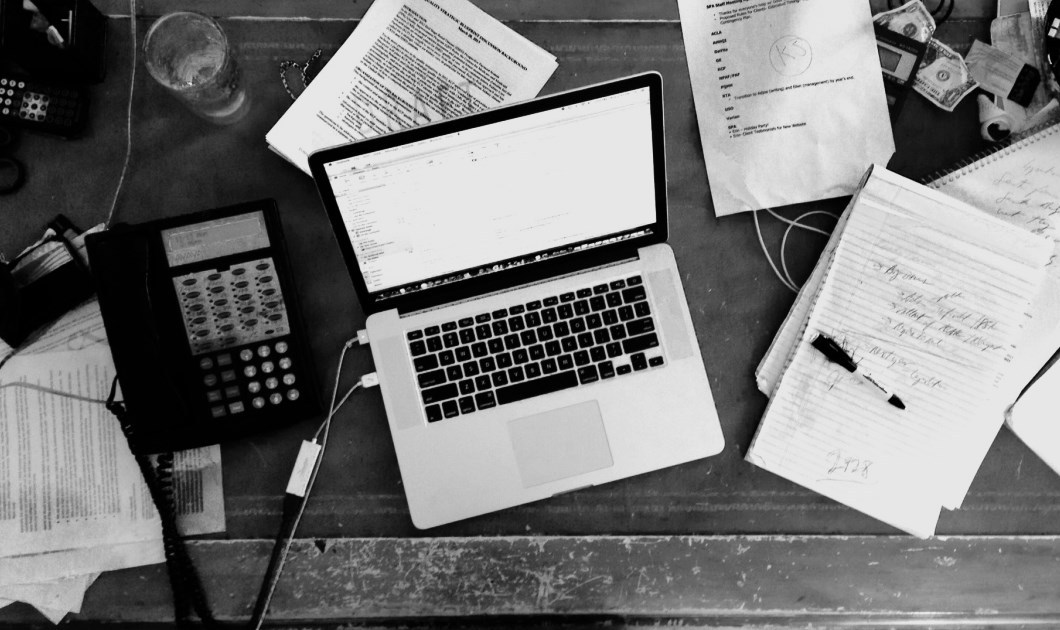
Love and Relationships
True love by haruki murakami, dating online by emily witt, no labels, no drama by jordana narin, the worst friend date i ever had by samantha irby, 50 more great articles about love and relationships, my first time, twice by ariel levy, tragedy averted. minimal gagging. by lidia yuknavitch, a girl's guide to sexual purity by carmen maria machado, deeply, truly (but not physically) in love by lauren slater, 50 more great articles about sex, peculiar benefits by roxane gay, thanksgiving in mongolia by ariel levy, long day's journey by elizabeth gilbert, trapped by aron ralston, the kingdom of the lotus by patrick symmes, 50 more great articles about travel, ultimate glory by dave gessner, skating home backward by bill vaughn, off diamond head by william finnegan, tennis, trigonometry, tornadoes by david foster wallace, 50 more great articles about sport.
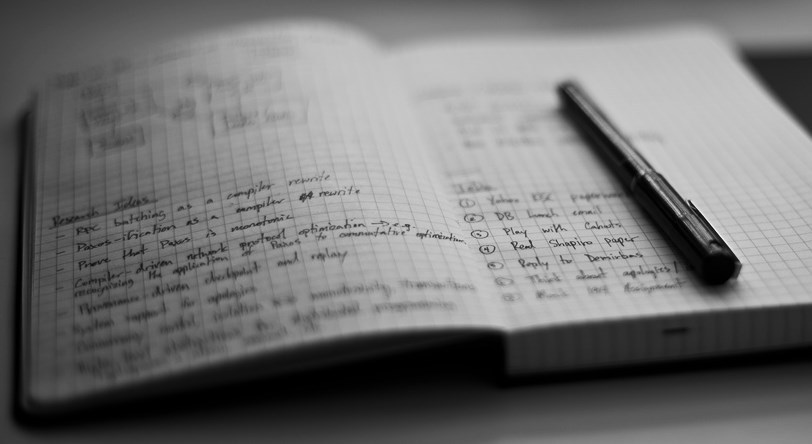
Notes of a Native Son by James Baldwin
How to slowly kill yourself and others in america by kiese laymon, the price of black ambition by roxane gay, 25 more great essays about race, the comfort zone by jonathan franzen, on being an only child by geoff dyer, a raccoon of my own by lauren slater, my dad tried to kill me with an alligator by harrison scott key, difficult girl by lena dunham, seventeen by steve edwards, age appropriate by jen doll, richard by allie brosh, 50 more great articles about growing up, lost in the meritocracy by walter kirn, dumb kids' class by mark bowden, fragments from an education by christopher hitchens, 20 more great articles about education, having children, joy by zadie smith, channel b by megan stielstra, a birth story by meaghan o'connell, i was pregnant, and then i wasn't by laura turner, 10 more great articles about having children.
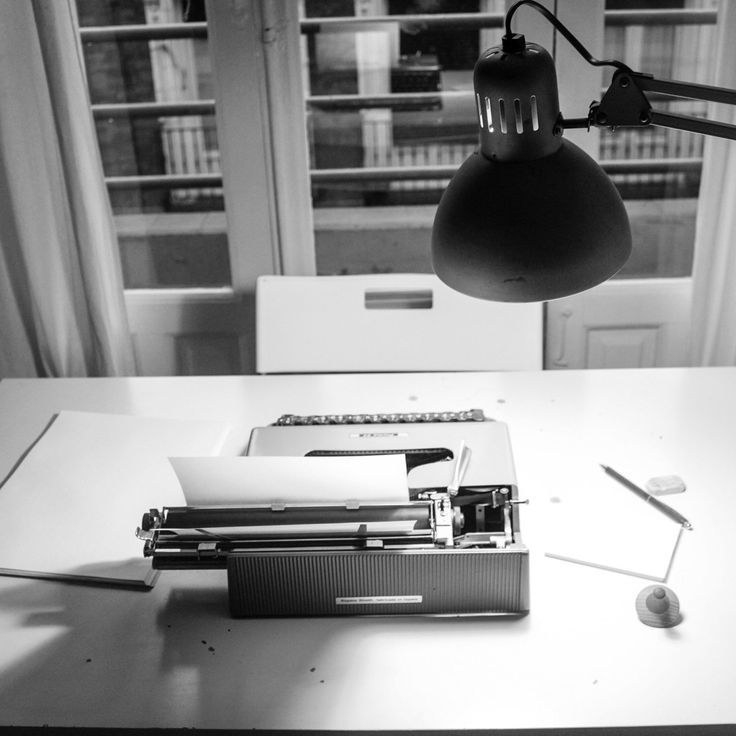
Patient by Rachel Riederer
The empathy exams by leslie jamison, 50 more great articles about health, mental illness, adventures in depression by allie brosh, darkness visible by william styron, insane after coronavirus by patricia lockwood, 20 more great articles about mental health, explicit violence by lidia yuknavitch, heroin/e by cheryl strayed, me & my monkey by anonymous, me and my girls by david carr, my addicted son by david sheff, how i let drinking take over my life by william leith, 10 more great articles about addiction, autobiography of a body by lucy grealy, a few words about breasts by nora ephron, a thin line between mother and daughter by jennifer egan, the broken country by molly mccully, the trash heap has spoken by carmen maria machado, saying goodbye to my chest by naomi gordon-loebl, the onset by my ngoc to, 20 more great articles about body image, see also..., 150 great articles and essays.
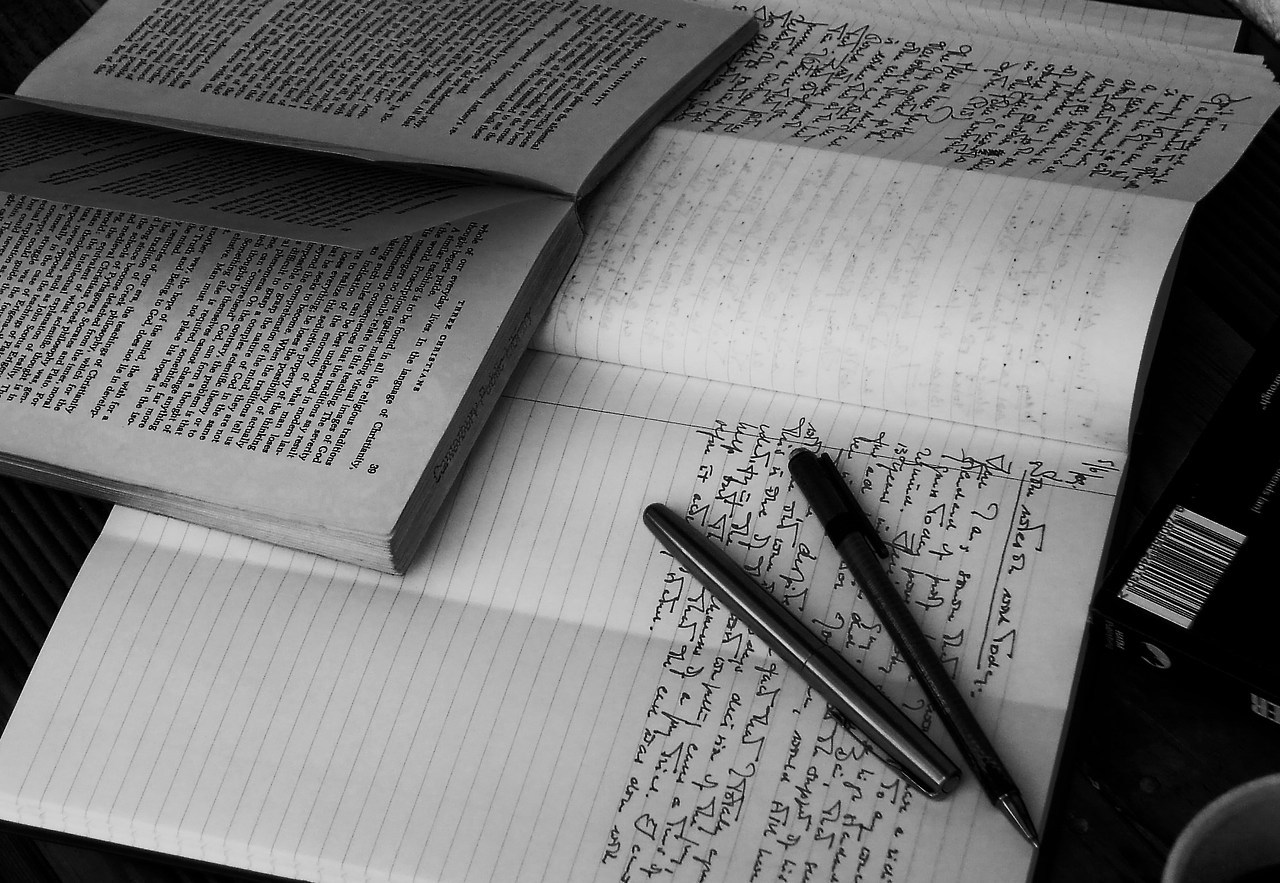
The Unspeakable Things Between Our Bellies by Lidia Yuknavitch
Woven by lidia yuknavitch, girl by alexander chee, pause by mary ruefle, lost cat by mary gaitskill, three by david sedaris, my life as an undocumented immigrant by jose antonio vargas, been down so long it looks like debt to me by m.h. miller, lucky girl by bridget potter, goodbye to all that by joan didion, my misspent youth by meghan daum, lost and found by colson whitehead, night-shifting for the hip fleet by mark jacobson, 25 more great articles about new york, the muse of coyote ugly saloon by elizabeth gilbert, quitting the paint factory by mark slouka, the loading dock manifesto by john hyduk, 40 more great articles about work, the real heroes are dead by james b. stewart, remains of the day by mary lee hannell, 10 more great articles about 9/11.

Book-Length Memoirs
Slouching towards bethlehem by joan didion, me talk pretty one day by david sedaris, just kids by patti smith, the chronology of water by lidia yuknavitch, a heartbreaking work of staggering genius by dave eggers, the glass castle by jeannette walls, brain on fire by susannah cahalan, irritable hearts by mac mcclelland, hunger by roxane gay, a sliver of light by shane bauer, joshua fattal and sarah shourd, 100 more great nonfiction books.
About The Electric Typewriter We search the net to bring you the best nonfiction, articles, essays and journalism
- Craft and Criticism
- Fiction and Poetry
- News and Culture
- Lit Hub Radio
- Reading Lists

- Literary Criticism
- Craft and Advice
- In Conversation
- On Translation
- Short Story
- From the Novel
- Bookstores and Libraries
- Film and TV
- Art and Photography
- Freeman’s
- The Virtual Book Channel
- Behind the Mic
- Beyond the Page
- The Cosmic Library
- The Critic and Her Publics
- Emergence Magazine
- Fiction/Non/Fiction
- First Draft: A Dialogue on Writing
- Future Fables
- The History of Literature
- I’m a Writer But
- Just the Right Book
- Lit Century
- The Literary Life with Mitchell Kaplan
- New Books Network
- Tor Presents: Voyage Into Genre
- Windham-Campbell Prizes Podcast
- Write-minded
- The Best of the Decade
- Best Reviewed Books
- BookMarks Daily Giveaway
- The Daily Thrill
- CrimeReads Daily Giveaway

The Memoir in Essays: A Reading List
Elizabeth kadetsky on the multiple ways we can look at the self.
While the personal essay has enjoyed continued popularity, a book-length collection of linked essays, centered on an author’s self or life, is less common than a traditional memoir or novel. A truly successful essay collection can reveal the author processing experiences at many different points in time and through many different lenses. As a writer, I’ve always been drawn to the essay as a form, for its concision, for its ability to highlight an intriguing gap between author and narrator that lends an inherent tension and self-questioning. A collection of essays treating the same or related inquiries multiplies this effect.
The distance afforded by those multivalent lenses can allow an author to regard one’s younger self as a different character, a different persona. This can create an unease or uncertainty that is exciting, and also very relatable to the reader. An author’s ability to forgive that earlier version of herself is especially prevalent in the memoir-in-essays, perhaps because of the extended time period covered as a writer composes essays across years or even decades.
We are lucky enough to be in the middle of a renaissance. Several recent and upcoming memoirs-in-essays use the inquisitive essay form to tell life stories from different vantage points and make the reader question and revel in unreliable narrators and new perspectives. The more traditional memoir focuses on seeking and attaining redemption. The nonlinear structure of an essay collection reveals that there is never easy redemption, never clear resolution: bad things happen for no reason; overcoming one trial does not lessen the need to adapt in the next.
These new, enchanting and powerful collections are a welcome reminder that in our collective state of unrest and unknown futures, there is a comfort in knowing that there is an inherent uncertainty in having the answers.
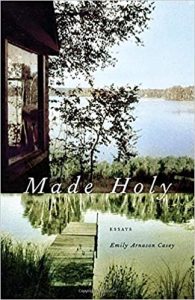
Emily Arnason Casey, Made Holy: Essays (University of Georgia Press)
In beautiful, scenic prose, Emily Arnason Casey probes her middle American childhood from the stance of different venues, times of life, and primary characters—a family cabin and repository for memories both happy and sad; a little sister who grew up and wasn’t a sidekick anymore; a mother who didn’t reveal the family propensity to alcoholism until it was too late; an aunt who succumbed to the illness’s lure. In a spiral-like structure that keeps returning to a central and unanswerable question—how, and why, must this family battle the draws and effects of alcohol addiction—Arnason Casey tells a poignant story of a “normal” family that through its quirks and desires must find a path to survival. The author finds solace in nostalgia and a way forward by examining the errors of the past and by embracing, as a mother, the promise of the future generation. Her probing and compulsive need to question reminds us that alcoholism has no simple etiology, and that its cures are as individual as they are elusive.
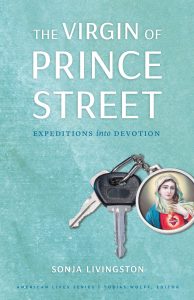
Sonja Livingston, The Virgin of Prince Street: Expeditions into Devotion } (University of Nebraska Press)
At a time of dwindling religiosity, Livingston finds herself wishing for greater connection to her Catholic roots while also exploring the physical space of the church in upstate New York that made memories for her as a child. Because of religious attrition, the church that she grew up in becomes the gathering space for dozens of rescued saint statues deaccessioned from other churches nearby. Livingston embarks upon a quest to find a missing Virgin Mary statue, that moves not in straight lines but elliptically, following a parallel physical and emotional journey that is an exploration into faith, Catholicism, and a desire for spiritual connection on modern terms. In examining the sustained power of a central icon of the Catholic church and an object of personal, sentimental attachment, Livingston’s linked essays highlight the irresolvable paradox of modern religiosity—that the seeker must follow an uncharted middle pathway when the old texts and their tropes, their patriarchy and their strictures, necessarily fall away.
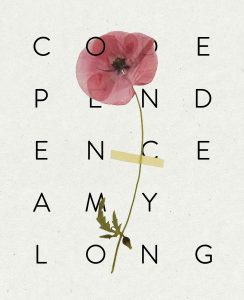
Amy Long, Codependence (Cleveland State University Poetry Center)
In this haunting and troubling book, Long revisits scenes and anecdotes from her boyfriend’s heroin addiction and her subsequent dependence on opioids for chronic pain. Formal experiments such as essays disguised as lists, prescription forms, and medical reports are interspersed among scene-driven recollections from different points in time: the author’s first introduction to the drug; the allure of an older addict; attempts at recovery. The grounding presence of the author’s supportive mother is offset by the narrative’s tragic other constant—the euphoria and escape offered by the drug. By eschewing a linear narrative structure, Long illustrates the difficulty of achieving recovery and puts lie to the myth that addiction is a logical disease that naturally ends with a cure. In its very form, this memoir undermines the narrative so prevalent in media treatments of this illness—that in order to trounce the beast, the individual suffering from addiction need only attend a recovery program. Having written about and witnessed my own sister’s decades’ long struggle to overcome opioid addiction, I was drawn to Long’s wisdom in portraying addiction not as a problem to be solved so much as a complexity to be observed and penetrated.
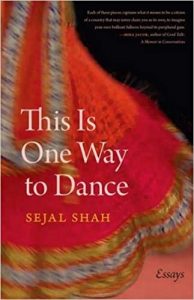
Sejal Shah, This Is One Way to Dance (University of Georgia Press)
The Indian-American author continually revisits her troubled relationship to her American identity through layered essays treating her bifurcated Indian and American past. Exploring her family’s immersion in Gujarati subculture when she was a child growing up in Rochester, New York; her experience as one of few people of color in her MFA creative writing program; and many family weddings in which she must confront her presumed future as a desi bride, Shah questions her place in both American culture and the thriving American-Gujarati subculture. By placing dates at the ends of the essays, it is suggested that her complicated and lifelong conflicts about race and cultural identity can be told chronologically. But, as she explains in her introduction, many essays had multiple end dates after having been revised and reconsidered as time moved forward. The multiple end dates elegantly upend the notion that a rational, hypothesis-thesis-synthesis structure can encompass the complexities of identity and belonging. Shah’s choice to write non-narratively about her conflicts of identity provide insight for anyone raised with a dual or multiple cultural identity—anyone who may, at different points of time, feel a greater allegiance to one culture, another, or a never straightforward amalgam of many. Who we understand ourselves to be, Shah’s book tells the reader in subtle ways, is not a fact so much as a moving target, an unending query.
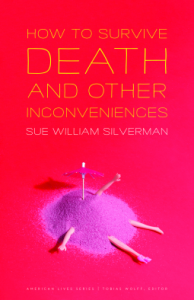
Sue William Silverman, How to Survive Death and Other Inconveniences (University of Nebraska Press)
Silverman is the author of three previous memoirs. In How to Survive Death and Other Inconveniences , she tells her life story through the lens of an obsession with death and the desire to come to terms with the inevitable but often avoided reality that in the end we are mortal. The essays begin with a chronological life story of growing up in New Jersey and encountering American culture’s death-avoidance, but then take a swerve when several brief but elusive mentions accrue into an account of a rape at a young age and a discovery that her memory of the event connects to her fixation on death. A chronological structure gives way to a thematic plot, in which Silverman seeks to confront her topic through reporting, immersion, and reflection—for instance by visiting a morgue, exploring mythological figures associated with death, and recollecting a family funeral. The sophisticated writing and structure make the whole greater than the sum of its many fascinating and worthy parts. Silverman’s essays continually reveal the irrational functioning of memory and how it connects our pasts to our worldviews. Honoring subconscious logic, How to Survive Death and Other Inconveniences makes the gambit that the mysteries of the self are both keys to understanding and uncertainties to be celebrated. We become who we are without being fully conscious of our choices—probing those choices won’t give us easy answers, but the discoveries along the way will be illuminating and well worth the necessary befuddlements.
__________________________________
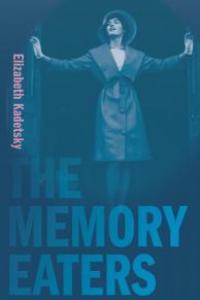
Elizabeth Kadetsky’s memoir , The Memory Eaters, is available now from University of Massachusetts Press.
- Share on Facebook (Opens in new window)
- Click to share on Twitter (Opens in new window)
- Click to share on Google+ (Opens in new window)
- Click to share on LinkedIn (Opens in new window)
- Click to share on Reddit (Opens in new window)
- Click to share on Tumblr (Opens in new window)
- Click to share on Pinterest (Opens in new window)
- Click to share on Pocket (Opens in new window)
Elizabeth Kadetsky
Previous article, next article, support lit hub..

Join our community of readers.
to the Lithub Daily
Popular posts.

Follow us on Twitter
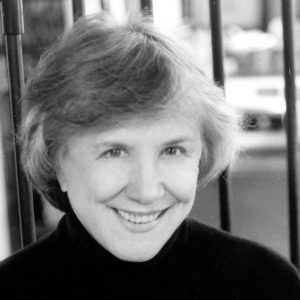
Remembering Deirdre Bair
- RSS - Posts
Literary Hub
Created by Grove Atlantic and Electric Literature
Sign Up For Our Newsletters
How to Pitch Lit Hub
Advertisers: Contact Us
Privacy Policy
Support Lit Hub - Become A Member
Become a Lit Hub Supporting Member : Because Books Matter
For the past decade, Literary Hub has brought you the best of the book world for free—no paywall. But our future relies on you. In return for a donation, you’ll get an ad-free reading experience , exclusive editors’ picks, book giveaways, and our coveted Joan Didion Lit Hub tote bag . Most importantly, you’ll keep independent book coverage alive and thriving on the internet.

Become a member for as low as $5/month
31 page-turning memoirs to read in your lifetime, from searing essay collections to celebrity bestsellers
When you buy through our links, Business Insider may earn an affiliate commission. Learn more
- Memoirs are the most personal account of nonfiction events.
- They give readers an engaging narrative that navigates historical hardships or personal triumph.
- The memoirs in this list were chosen for their unique stories and writing style.

Memoirs are hugely popular as readers gravitate towards the personal lens of real events, with the best ones almost reading like fiction. These remarkable, sometimes tragic, always inspirational stories bring us into the lives of people we've never met, giving us a wider understanding of humanity and of the promise one life can hold.
Each memoir on this list was chosen because it had a unique story with the potential to change how we understand the world. Some follow celebrities and others are a glimpse into the life of someone we probably never would have known. Capturing a human experience within the pages of a book is often raw and emotional, but so many of the memoirs in this list are also funny and highly entertaining. I'm thrilled to share with you my memoir recommendations because I feel these stories demand to be heard.
A formerly anonymous account of an infamous assault
"Know My Name" by Chanel Miller, free with Audible trial, $11.99 on Kindle, $16.20 for paperback
This is the best, most painful, most powerful memoir I have ever had the pleasure to read. I often go into books with no expectations of the author or the plot, so when the first chapters of this book introduced me to Chanel Miller and her story, I was floored. We've heard the name "Brock Turner" over and over, a convicted sexual assailant hailed for his swim records while an anonymous woman's letter circulated the internet. With the publication of this book, Chanel's words beg us to know her name and her story.
Memorable quote: "It is not a question of if you will survive this, but what beautiful things await you when you do."
An anecdotal Asian American essay collection
"Minor Feelings: An Asian American Reckoning" by Cathy Park Hong, free with Audible trial, $13.99 on Kindle, $15.98 for paperback
"Minor Feelings" is an essay collection on what it means to experience racial stereotyping, historical trauma, and societal invalidation as an Asian American. This is an honest, original, and representative storytelling of identity and culture in a society where one of the most diverse demographics is often reduced to "the preferred minority." Especially with the recent rise of violence against Asian Americans , this is a crucial read, among many , to understand the ignorance and racism endured by Cathy Park Hong and so many others.
Memorable quote: "Asian Americans inhabit a purgatorial status: neither white enough nor black enough, unmentioned in most conversations about racial identity.
Michelle Obama's wise and reflective life story
"Becoming" by Michelle Obama, free with Audible trial, $12.99 on Kindle, $11.89 for hardcover
There's something for everyone in "Becoming," no matter your political view or opinion of the Obama family. Michelle's life story is one of challenge and promise, hope, and perseverance. Her book begins with her childhood, through meeting Barack at a law firm, and continues all the way through her time in the White House. Her anecdotes and advice overflow with inspiration, empathy, and patience. Besides being absolutely delightful and refreshing, Michelle Obama's memoir further demonstrates why she's become such an icon for young women to become confident and inspiring women themselves.
Memorable quote: "At fifty-four, I am still in progress, and I hope that I always will be."
A grief-stricken memoir
"The Men We Reaped" by Jesmyn Ward, free with Audible trial, $10.04 on Kindle, $11.56 for hardcover
Jesmyn Ward (the author of " Sing, Unburied, Sing ") has lived through a lot of death, losing five men in her life in four years. She struggled with the "why" of it all until the answer became clear: though each man died of different causes, they all came back to racial and economic struggles. There is a lot of grief in her story as she navigates the statistics of racial poverty and their personalized effect on her, her family, and her community.
Memorable quote: "We tried to outpace the thing that chased us, that said: You are nothing."
A series of wildly entertaining restaurant adventures
"Kitchen Confidential" by Anthony Bourdain, free with Audible trial, $12.60 on Kindle, $17.84 for hardcover
Hailed as an iconic chef, traveler, and journalist, Anthony Bourdain's memoir is a trip through all the hilariously bad behavior in the back of every great restaurant. Bourdain held nothing back in his storytelling, exposing the hidden and often dirty secrets to which anyone who has ever worked in a kitchen can attest. His words are that of a seasoned professional, a voice empty of arrogance but full of endearment for the often chaotic nature of the industry.
Memorable quote: "Your body is not a temple, it's an amusement park. Enjoy the ride."
The story of one woman's improbable success

"Educated" by Tara Westover, free with Audible trial, $12.99 on Kindle, $13 for hardcover
Tara came from a Mormon, survivalist mountain family; her father's fears of the end of the world dictated that the children would never receive an education, proper medical attention, or even have birth certificates. When she was accepted to Brigham Young University after spending years teaching herself math and grammar, her life became driven by her thirst for knowledge. Tara writes with poise, patience, and wisdom that radiates through her pursuit of self-identity, going beyond trauma and towards a balance between forgiveness from where she came and passion for where she's going.
Memorable quote: "'You can love someone and still choose to say goodbye to them,' she says now. 'You can miss a person every day, and still be glad that they are no longer in your life.'"
The fierce account of an unstoppable young woman
"I Am Malala" by Malala Yousafazi, free with Audible trial, $9.99 on Kindle, $8.30 for hardcover
On October 9, 2012, Malala Yousafazi was shot in the head while riding the bus home from school, having tirelessly fought for her right to an education. Malala has since become famous for her human rights advocacy, specifically for Pakistani women, and is the youngest woman to receive a Nobel Peace Prize. Her memoir is the story of the fight for freedom against seemingly impossible odds — about being a daughter in a world that values only sons, and speaking up even when everyone is trying to keep you quiet.
Memorable quote: " We realize the importance of our voices only when we are silenced."
The contemplative work of a terminally ill neurosurgeon
"When Breath Becomes Air by Paul Kalanithi" free with Audible trial, $9.99 on Kindle, $14.64 for hardcover
What makes a life worth living? At 36, Paul Kalanithi was a life-saving neurosurgeon whose career came to a halt as he was diagnosed with Stage IV lung cancer. Now a patient confronting his own mortality and seeking a broader understanding of this life , Paul digs into all of life's great questions as his own slips away. He lost his battle with cancer while writing this memoir, leaving much for us to think about as we continue on.
Memorable quote: "There is a moment, a cusp, when the sum of gathered experience is worn down by the details of living. We are never so wise as when we live in this moment."
A collection of personal essays on mental illness
"The Collected Schizophrenias: Essays" by Esmé Weijun Wang, free with Audible trial, $9.99 on Kindle, $12.53 for hardcover
By combining research in her personal essays, Esmé Weijun Wang explores schizophrenia both in her own mind and through the lens of our society as we struggle to understand and care for mental illness. The book begins with a technical explanation of schizoaffective disorders and their effects, providing a necessary perspective on which her memoir is based. Her stories are extremely important, a candid telling of exceptionally personal experiences in a world where she and her diagnosis are frequently misunderstood.
Memorable quote: "I tell myself that if I must live with a slippery mind, I want to know how to tether it too."
A father's letter to his son
"Between The World And Me" by Ta-Nehisi Coates, free with Audible trial, $12.99 on Kindle, $14.99 for hardcover
Told in the form of a letter to his son, Ta-Nehisi Coates attempts to answer the biggest questions he's encountered in his life about race, America's history, and how to protect his son from an unforgiving world. The story is profoundly raw and real, one that combines our history with the current political climate and will undoubtedly be hailed for years to come.
Memorable quote: "You are growing into consciousness, and my wish for you is that you feel no need to constrict yourself to make other people comfortable."
A painfully honest story of getting lost in order to be found
"Wild: From Lost to Found on the Pacific Crest Trail" by Cheryl Strayed, free with Audible trial, $11.99 on Kindle, $16.53 for hardcover
Cheryl Strayed had almost zero hiking experience and no real training when she decided to embark on the Pacific Crest Trail which spans from the Mojave Desert to Washington State. Four years prior, her mother's death spurred a whirlwind of addiction, anger, and heartbreak that pushed her to the point of giving up. The story of her hike is a brutal and honest one. But in order to find herself again, Cheryl needs to come to terms with her mistakes — a journey into which she welcomes us in the form of this book.
Memorable quote: "How wild it was, to let it be."
One woman's journey from refugee to Congresswoman
"This Is What America Looks Like" by Ilhan Omar, free with Audible trial, $12.99 on Kindle, $16.59 for hardcover
Ilhan was one of seven children being raised by her father and grandfather when her family fled Somalia and found themselves in a refugee camp in Kenya. Surrounded by poverty, starvation, and death, it took four years for her family to reach Virginia. Determined to find her American Dream, Ilhan worked through every hardship to her election to Congress in 2019. Her memoir is an incredible account of Ilhan's determination to not only survive but thrive in environments that could have broken her. It is uniquely eye-opening and transparent, a look into her endurance through the impossible.
Memorable quote: "As a refugee who fled civil war as a child, I am still trying to figure out where I fit in — which is perhaps why the most important note I found sticking to the wall outside my office had only three words. You belong here."
A narrative of incarceration and justice
"Just Mercy" by Bryan Stevenson, free with Audible trial, $12.99 on Kindle, $9.11 for paperback
Bryan was a young lawyer in Alabama when he founded the "Equal Justice Initiative" — a law office committed to defending prisoners wrongly convicted, too poor to afford proper representation, or those not given a fair trial. This memoir focuses on the early days of the firm and one of the first clients, Walter McMillian, a Black man wrongly convicted of murder. If you don't know much about the mass incarceration or racial inequality in America's justice system, this is a great place to start.
Memorable quote: "Each of us is more than the worst thing we've ever done."
A memoir that will make you feel alright, alright, alright
"Greenlights" by Matthew McConaughey, free with Audible trial, $14.99 on Kindle, $16.95 for hardcover
"Greenlights" is a memoir that radiates with McConaughey's iconic country-boy coolness through the printed words about life lessons, patience, "catching greenlights" and the wisdom that the "yellows and reds eventually turn green, too." Matthew McConaughey's novel reads like an old friend sitting down with you on the front porch as the sun sets on a summer night — it's supremely warm and comfortable, full of wisdom collected from nearly 50 years of Matthew's diaries.
Memorable quote: "Stepping in shit is inevitable, so let's either see it as good luck, or figure out how to do it less often."
An inside look at a rising political figure
"Shortest Way Home: One Mayor's Challenge and a Model for America's Future" by Pete Buttigieg, free with Audible trial, free on Kindle for Prime members, $15.77 for hardcover
At 29, Pete Buttigieg was the youngest elected mayor in the nation and held a vision to revitalize South Bend, Indiana. In recent years, he has emerged onto the national political stage for his unparalleled successes, even holding his mayoral position when he deployed to Afghanistan as an officer in the Navy. His memoir is authentic, endearing, and optimistic. It's also a great way to learn more about Buttigieg's policies, accomplishments, and aspirations for the future of our country.
Memorable quote: "A river is made drop by drop."
A composition of a noteworthy Supreme Court Justice
"My Own Words" by Ruth Bader Ginsburg, free with Audible trial, $12.99 on Kindle, $9.18 for paperback
This is a collection of RBG's writings and speeches, with each chapter given an introduction to provide historical context. It spans a wide range of topics, from feminism to the inner workings of the Supreme Court. A combination of legal decisions, advice from her mother, and stories of her strides towards gender equality make for a lasting memoir of a woman whose legacy endures.
Memorable quote: "When a thoughtless or unkind word is spoken, best tune out. Reacting in anger or annoyance will not advance one's ability to persuade."
A memoir for a YA audience
"All Boys Aren't Blue" by George M. Johnson, free with Audible trial, $10.99 on Kindle, $14.10 for hardcover
Told in a series of essays, this memoir annotates the struggles of queer, Black boys and men in our society. For some readers, it's a reassurance that there is a place in this world for us to be uniquely ourselves and thrive despite setbacks. For others, it's a call to be the ally that could save a person's life. George M. Johnson's essays address tough subjects like toxic masculinity, consent, and questioning one's gender identity in an accessible way. The book is geared towards a young adult audience, making it a great outlet to explore gender, sexuality, and race by fostering supportive environments and open conversations.
Memorable quote: "The first person you are ever an activist for is yourself. If I wasn't gonna fight for me, who else was?"
A raw account of the long journey to loving oneself
"Over The Top" by Jonathan Van Ness, free with Audible trial, $11.99 on Kindle, $12.90 for paperback
I absolutely adore "Queer Eye" and Jonathan Van Ness's radiance, encouragement, and clearly genuine love for those around him. I picked up his memoir thinking it would be fun and light, but Jonathan also opens up about some hidden hardships like bullying, trauma, and addiction. Every bit of JVN's sparkling personality shines through his memoir, a demonstration of how bright and shiny we can become.
Memorable quote: "As scary as this can be I want you to know no matter how broken you feel, and how seemingly unlikely it is, we are never too broken to heal."
The dark years of an American musician's childhood
"Hollywood Park" by Mikel Jollett, free with Audible trial, $14.99 on Kindle, $14.74 for paperback
Mikel Jollett was born into the Church of Synanon, one of the country's most infamous cults. By cult law, Mikel was taken from his mother at six months old and raised in their "school," finally escaping years later with his mother and brother. This is the poetic yet painful story of a life both in and out of the cult, peppered with addiction, trauma, and abuse. Ultimately, this memoir is a testament to strength and love. The beginning is told through the perspective of a child, enduring the cruelties of the cult, but the voice morphs as Mikel escapes and begins to experience and understand the world more.
Memorable quote: "How long can you live with ghosts before deciding to become one?"
The childhood account of an iconic American poet
"I Know Why the Caged Bird Sings" by Maya Angelou, free with Audible trial, $6.99 on Kindle, $15.49 for paperback
This is a precious and painful memoir of a woman who shaped poetry and literature and is an idol to so many today. It spans Maya Angelou's childhood, addressing the abuse she endured and letting other women know they are not alone. This book, which has been banned in many schools and libraries, tells the story of how words saved Maya's life.
Memorable quote: "There is no greater agony than bearing an untold story inside you."
The story of strained yet unconditional familial love
"The Glass Castle" by Jeannette Walls, free with Audible trial, $12.99 on Kindle, $7.09 for paperback
Jeannette Walls spent much of her life hiding the secrets of her nomadic and deeply dysfunctional childhood. One of four children born to wanderer parents, Jeannette's family found themselves settling down in a mining town in Virginia once their money ran out. The dysfunction escalated as her father used destructive means to try and escape the confines of "normal" life, leaving the children desperate for escape. This memoir spent over 440 weeks on the "New York Times" Bestseller list, a balance of bright successes and dark childhood hardships. It's interesting to feel Jeannette's withstanding love for her family, even as we the readers resent them more and more.
Memorable quote: "You should never hate anyone, even your worst enemies. Everyone has something good about them. You have to find the redeeming quality and love the person for that."
One woman's notable spiritual journey
"Eat, Pray, Love" by Elizabeth Gilbert, free with Audible trial, $13.99 on Kindle, $15.67 for hardcover
"Eat, Pray, Love" has become such an undeniable classic in the 14 years since its publication. For a while, it had the reputation of the favorite amongst Mom Book Clubs, but Elizabeth Gilbert's pursuit of fulfillment in every aspect of her life is one we all might need. At 30, Elizabeth Gilbert hit an early mid-life crisis as she found herself deeply unhappy in a textbook-perfect life. The memoir follows her yearlong journey around the world after quitting her job, selling all her belongings, and setting off on a spiritual expedition.
Memorable quote: "This is a good sign, having a broken heart. It means we have tried for something."
Barack Obama's newest memoir
"A Promised Land" by Barack Obama, free with Audible trial, $17.99 on Kindle, $23.23 for hardcover
I will admit, I'm still in the middle of reading this memoir and I am savoring it for as long as I can. Obama's work fills me with the warmth of nostalgia, even as I'm reading through some of the hardest days of his presidency. His intimate account of the events we saw plastered against the news for years is fiercely engaging, paired with the ease of writing as smooth as his voice. One of a series of future presidential memoirs by him, this one is captivating for the insight of a firsthand experience and the perspective gained in the years since his time in office.
Memorable quote: "Either you seize what may turn out to be the only chance you have, or you decide you're willing to live with the knowledge that the chance has passed you by."
A uniquely illustrated memoir
"The Fire Never Goes Out" by Noelle Stevenson, $9.99 on Kindle, $12.99 for paperback
A compilation of personal essays and mini-comics, Noelle's memoir is that of the roller coaster of a creative life. This one is for every reader with a creative side who understands the highs and lows of creating art. The memoir spans about eight years. so it's really interesting to see her work morph, pivot, and grow over the course of the book. We've all heard "a picture is worth a thousand words" but I was still surprised at how revealing her artwork was through her transformative young adult years.
Memorable quote: "Love your younger self, and let them die."
A harrowing holocaust account
"Night" by Elie Wiesel, free with Audible trial, $7.46 for paperback
This memoir is not for the faint of heart. It does not tiptoe around the atrocities of the Holocaust or cushion the horrors within the confines of a concentration camp. T his is Elie's story as his family was taken from their home in 1944 and detained in Auschwitz. It is a short read that will transport you to the center of the pain, the abuse, and the murder of the Holocaust.
Memorable quote: "To forget the dead would be akin to killing them a second time."
Sylvia Plath's vivid journal entries
"The Unabridged Journals of Sylvia Plath," free with Audible trial, $9.99 on Kindle, $15.49 for paperback
Sylvia Path's journals were first published in 1982, though heavily abridged. This memoir is a compilation of the complete, unedited, and remarkably introspective journal entries of the last 12 years of Sylvia's life until her death at age 30. Her writing is intriguing and intimate and I often had to remind myself of her age — my perception was completely skewed by the maturity in her thoughts. If you ever loved her poetry or "The Bell Jar," this is one to pick up.
Memorable quote: "I want to live and feel all the shades, tones and variations of mental and physical experience possible in my life."
Stephen King's advice and anecdotes
"On Writing" by Stephen King, free with Audible trial, $12.99 on Kindle, $14.56 for paperback
Both memoir and mentorship, "On Writing" is a must-read for any aspiring writer, Stephen King-lover, or storyteller. The stories about his life are largely entertaining, dating back to his love for books as a young child all the way through his prominent writing career. The advice and inspiration in his memoir are profound, with so many quotable moments you'll cling to long after you've finished the book.
Memorable quote: "The scariest moment is always just before you start."
Nelson Mandela's incredible story
"Long Walk to Freedom" by Nelson Mandela, free with Audible trial, $11.99 on Kindle, $23.01 for paperback
When I was given Nelson Mandela's over- 700-page memoir, I was intimidated (to say the least). I'd known the most famous parts of his life — from his imprisonment to him receiving the Nobel Peace Prize — but this memoir blew me away with just how instrumental and powerful his work was. The writing is clear and direct, leaving his life lessons and personal experience to speak for themselves.
Memorable quote: "And as we let our own light shine, we unconsciously give other people permission to do the same."
An account of healing through non-traditional therapy
"Group: How One Therapist And A Circle of Strangers Saved My Life" by Christine Tate, free with Audible trial, $13.99 on Kindle, $14.49 for paperback
In her memoir about the saving grace of strangers, Christie Tate was a law student when dark thoughts led her to seek therapy and her therapist led her to a psychotherapy group. It's easy to find the dark humor in this memoir and get lost in the problems of complete strangers while happily ignoring our own (at least for a little while). Christie finds a deeper connection and a sense of intimacy with this group of strangers as they discuss sex, childhood, and destructive habits. It's a fantastic normalization of non-traditional therapy practices and a story that's simultaneously entertaining and comically uncomfortable.
Memorable quote: "If you're serious about getting into intimate relationships — becoming a real person, as you said — you need to feel every feeling you've been stifling since you were a kid. The loneliness, the anxiety, the anger, the terror."
An inspirational, gender-focused memoir
"Sissy: A Coming-of-Gender Story" by Jacob Tobia, free with Audible trial, $9.99 on Kindle, $26 for hardcover
I will absolutely never forget the day I wore purple lipstick for the first time and just happened to meet Jacob Tobia, who told me they loved the shade and asked where I got it. This tiny but affirming interaction between strangers is a testament to the kindness that radiates from Jacob everywhere they go — and in their memoir. Labeled "sissy" at a young age, Jacob grew to power a gender revolution alongside transgender, non-binary, and other gender-nonconforming folks. Their book is extremely vulnerable which allows us to take part in their journey and think about gender in ways we haven't before.
Memorable quote: "I'm sharing this with you because I want you to understand that telling a boy not to wear a dress is an act of spiritual murder."
The story of two famous podcast hosts
"Stay Sexy & Don't Get Murdered" by Karen Kilgariff and Georgia Hardstark, free with Audible trial, $9.99 on Kindle, $26 for hardcover
"My Favorite Murder: is one of the most popular true-crime murder podcasts out there. Since 2016, Karen and Georgia have sat down and swapped well-researched murder stories, telling them for the first time during recording so their reactions are real and hysterical. We've gotten to know these two through their podcast, but their memoir gives a more genuine look into the backstories behind their best advice to not get murdered (my personal favorite being "F** politeness.") Their writing is each reflective and witty, no matter how difficult the subject.
Memorable quote: "We barely get any time on this planet. Do not spend it pleasing other people."
- Main content

Memoir Magazine

2024 Memoir Prize For Books-Deadline Extended- February 29, 2024!
Deadline Extended: February 29, 2024! Now, in its 4th year, the Memoir Prize awards Memoir and Creative Nonfiction book length works of exceptional merit in the...

How Can Black People Go Camping at a Time Like This? by Debra Stone
We bought the trailer after Trump became president, a safety net, in the probability of needing a means of escape. Maybe Canada then on to Cuba? At least it eas...

Dinner In Apartment 4N by Nancy Reckler
*Artwork by Elisa Peterson This time, their argument began in the kitchen. I sat next to my sister as my parents stood over us yelling and cursing across the bl...

Passenger Trains and Other Forbidden Loves by Jonathan Odell
People are quick to ask me when I discovered I was gay, like one day I got a registered letter in the mail. Or maybe they are fishing for a steamy sex story exp...

What Love Looks Like in Public by Jacqueline St. Joan
The urge to move is nameless, both voluntary and involuntary. The trick is to get that far and then get out of the way. Follow it to the first words and then ...

Vigil by Shirlee Jellum
*Featured Artwork by Tara Koger/Columbus Community Deathcare “…when the time comes to let it go…” —Mary Oliver I Outside the door I linger, close my eyes, breat...

A Lunchtime by Kate Dowling
*Featured Artwork: “Rain” by Ann Marie Sekeres I had to go out that lunchtime. Some DVDs were due back at Blockbuster, we were nearly out of milk an...

Along Came Bobby by Jordan Midgley
Every now and again, Bobby will call me, or I’ll call him. We talk about politics, drama, scandal, funny stories, old friends, his son’s service in the Navy, my...

The Sweetness of His Breath by Kristen Lambertin
My son looked so small in the hospital bed. “Will this change my life? Will I still be able to play soccer?” he asked. “Yes and yes,” I said, “but not necess...

Atlantic Terminal 2015 by Tanya E. Friedman
The child whose hand I held, my daughter whose brown skin matched the boys and the police and not my whiteness: I lifted her, not to see the scene, but the oppo...

Dead Weight by Claire O’Brien
I’ve been to thousands of death scenes. I knew what your family would say even before they found you. I know you’re the third suicide that this firefighter has ...

Your Greatest Fear by Sherri Wright
In the United States about six million people over 65 live with Alzheimer’s disease. You wonder how much your mother knew and if she suffered. Looking back, ...

The Body History by Jessica Marks
My body is a series of numbers. I weigh 204, I wear a size 16. My waist is eight inches smaller than my hips, my breasts are 38B. I should probably go up to a 4...

Children of a Deaf(er) God, Part 1 of 2 by Kevin Garrison
I read the Bible each morning partly because I want to know the scriptures; I read partly because I want my ears to be healed; I read partly because I want to b...

2023 Memoir Book Prize Winners
Memoir Magazine is delighted to share the winners of the 2023 Memoir Prize for Books! Congratulations to our Grand Prize winner, Finalists, and Category winners...

Hearts Are Public By Lola Kelly
“People can have crushes just on boys or just on girls???… Why? How does it work? What’s wrong with-” “There is NOTHING wrong with them! Don’t say that!” ...

Waiting on the Stair by Jonathan Odell
This was 1972 and gay sex was definitely taboo. Not only was it against the law, the president of the university, a rabid segregationist, also hated queers. He ...

Pesach 5770 by Deborah Adelman
On this night, I have to beg permission from the hospital authorities to let you leave so you can join the Seder...I don’t look up to the heavens when I am on t...

Drowning by Natasha Williams
He was disheveled and smelled like cooked grease and cigarettes. It was an odor I associated with his being poor and hemmed in. There was so much about our life...

Frankenstein’s Daughter by Sherry Shahan
Maybe I should tell her that Daddy drives with his knees while poking triangle holes in beer cans? Or that he once fell out his car door while rounding a corner...
Short, sweet and infrequent! Stay up-to-date with curated content, links to book reviews, interviews, craft essays, contest and submission announcements, and other excellent resources for memoir writers! All for FREE!
- Skip to main content
- Skip to primary sidebar
- Skip to footer
Memoir coach and author Marion Roach
Welcome to The Memoir Project, the portal to your writing life.
How to Write A Memoir in Essays

Sorting the Stories — Memoir as Essay Collection
by Linda Styles Berkery
When I told a friend that I was taking a memoir-writing class, she replied, “Your life just isn’t that interesting.” Obviously she was thinking autobiography , not understanding memoir . I ignored her comment and continued to write about the small threads of wisdom I’ve learned.
After many edits, additions, and subtractions, I had built a wardrobe. I had a collection of fourteen personal essays—each one told through the lens of a dress. A Little Black Dress —learning compassion as illustrated by growing up in a funeral home. Memory Gown —naming mistakes as illustrated by a trip to the ER. Red Mini —seeing individuals as illustrated by teaching third grade. Ordinary dresses can bring out profound lessons.
Since all the writing pieces were in essay format, I adjusted Marion Roach Smith’s famous writing math, It’s about X as illustrated by Y to be told in a Z , and made a chart. To my Z factor, (essays) I added color and noted the dress: a turquoise paisley print, a navy maternity dress, an orange Hawaiian muumuu, a yellow sundress from 1941, a blue velvet jumper.
Each essay could stand alone, yet a book kept coming to mind. It was not enough to say I have a collection of “dress stories” of different length and various moods. I had more work to do. Although my structure would not be typical of a book length memoir (Act 1, Act 2, Act 3), even memoir as an essay collection must have an overall arc—a roof overhead, not just dress threads running through. Yes, memoir can be an essay collection, but it still needs structure and order.
I printed each story individually and laid them across my living room carpet. I knew which essay to put first and which would be last, but the other twelve? Originally I was tempted to group them. These three relate to my father’s WWII stories—put them together. Two had childhood dresses. My husband was mentioned in this group. But nothing really worked until my wonderful editor, Robyn Ringler, passed along tips she had learned from her own writing coach.
“Mix them up,” Robyn suggested. “Vary the word count. Don’t try to force the order, but pay attention to the emotions and lessons in the stories. Then, after you collect everything in the order you think might work, read the last paragraph of one story and the first paragraph of the following story and see if that works. You might need to do that process a few times.”
Robyn was right. I did arrange the essays a few times. But since these were, after all, dress stories, I got creative. If I had a photo of the dress, or a scrap of material from the dress, I stapled it to the printed page. Clearing a closet rod, I hung each essay from fourteen skirt hangers and started arranging them for a book. (Don’t try this at home.) I moved them and moved them until I could see a lovely rainbow arc for the entire collection.
When I was finally comfortable with the flow, I released my dress stories from their hangers and returned to the computer to cut and paste the individual essays into one long document. More edits. Moving paragraphs. Breaking up stories into parts. Adding just a bit more here and there. Writing an introduction and a final note to the reader. Two years after I wrote the first “dress story” for a memoir class, the book was published as Reflections: A Wardrobe of Life Lessons. Memoir, like a classic great dress, never goes out of style.
From the Introduction:
The hardest years in life are those between ten and seventy.
—Helen Hayes
At ten, I wasn’t the moody middle child wanting to be noticed, as much as the one who always seemed to notice. I was the sorter of stories, the keeper of traditions. Reaching up, or out, or down, I saw invisible threads that joined people together. I still do. Now, at seventy, I’m connecting more strands. And dresses are coaching my memory.
Three hard white suitcases live under my bed. I yank out the middle one and plop it on the blue star quilt. I’m not loading it up for a trip; it’s already full. I know what’s inside: dresses, scraps of fabric from dresses, and old photos. Clicking on the double locks feels like opening a black box of flight recordings. Messages vibrate from crinkles and creases, stains and frills. Memories rise from cotton, velvet, and silk—fibers from my journey through life.
Wisdom remains on the fold of one dress. I smooth a wrinkle and kindness appears. When I trace my pinky over white lace, I remember letting go. Hope is in there too, along with judgment, loss, compassion, forgiveness…a wardrobe of memories just waiting to be unpacked. Ralph Waldo Emerson said, “Life is a succession of lessons which must be lived to be understood.” I agree. But sometimes a life lesson can also be worn as a dress.
Excerpt from a middle essay: Navy Maternity
My first maternity outfit was a long-sleeved navy blue dress from Sears that I bought for my father’s wake and funeral. I wore it again on Father’s Day and then buried it under the lilac bush in my childhood backyard, watering the ground with my tears. The words from a homily echoed in my head. Ritualize where you are now . That’s what I was doing—dressing a wound by burying a dress…
The moment I stepped out of that dress, I felt different. Lighter. Aware. I was carrying a new life—had been all along—but now I could finally breathe. I glanced in the mirror and saw myself as a mother-to-be. I shoved the dress in the bag and tossed it in the car. The dress was easy to remove, but not the grief. Shifting my focus to new life, I decided to take one small step.
The following week, on my final day of teaching elementary school, I drove to my childhood home only two blocks away. I pulled the navy maternity dress from the white plastic bag. My mother was at work. But I didn’t need her. I knew where my father’s garden tools were kept. I grabbed a shovel and began digging in the dirt near the lilac bush—Dad’s favorite bush. It didn’t take long to scoop a hole big enough to bury a death dress…
Excerpt from the final essay: Dressing for a Reunion
At the Hyatt Regency Hotel near Dulles Airport, I’m wearing the same tri-colored dress that I wore for my 50 th high school reunion in 2016—it’s mostly blue, with bands of black and white. I call it my past-present-future dress. The dress is making an encore appearance in 2017 at a different reunion tonight. Can it really be called a reunion if we’ve never met? My husband tells me to hurry. We exit the elevator and enter a full dining room. The celebration begins.
Arms reach across the table to shake my hand. A shoulder nudges close. I feel a tap on my back. Legs move toward me. Fingers clasp. Another arm extends around my waist. Then hugs, so many embraces and tears. I am aware of my middle-ness. I am a quiet middle child, in the middle of a loud story. I am in the middle of history, in the middle of generations, in the middle of Danish fishermen and American flyers. I’m standing in the middle of memory and expectation because I did what middle children do best—I made connections…
Author’s bio: Linda Styles Berkery holds an M.A. from Russell Sage College. Linda taught third grade, led retreats and worked in parish ministry. Her writings on faith/life have been published in various magazines, blogs and books. Her new book is Reflections: A Wardrobe of Life Lessons.
HOW TO WIN A COPY OF THE BOOK I hope you enjoy Writing Lessons. Featuring well-published writers of our favorite genre, each installment takes on one short topic addressing how to write memoir. It’s my way of saying thanks for coming by. Love the author featured above? Did you learn something in the how-to? Then you’ve got to read the book. And you can. I am giving away one copy, and all you have to do to win is leave a comment below about something you learned from the writing lesson or the excerpt. I’ll draw winners at random (using the tool at random dot org) after entries close at midnight on May 15, 2019. Good luck!
Share this:
Related posts:
- Writing Lessons: Picking Small Topics To Write About
- Writing Lessons: Finding Time to Write
- Writing Lessons: How to Write About A Difficult Subject, by Bette Lynch Husted
GET THE QWERTY PODCAST

Subscribe free to the podcast
Reader interactions.
Amy Laundrie says
April 14, 2019 at 7:37 am
I found this extremely helpful. I’m a columnist for “The Wisconsin Dells Events” and am searching for a way to connect my “Slice of Life” columns into a second memoir. My first, “Laugh, Cry, Reflect: Stories From a Joyful Heart” includes pieces on nature, my pet ducklings, antidotes about my teaching career, and family stories. I appreciate the tips on how memoirists should make sure the last paragraph of one piece ties in with the first paragraph of the next and I think using dresses as a uniting metaphor was brilliant. I’m eager to read your book.
April 14, 2019 at 10:50 am
Dear Amy, I appreciate your kind words. I had a lot of fun using dresses as a thread through the essays. I would love to read your own slices of life columns. Marion has helped all of us go small. Linda
Susan Davies says
April 14, 2019 at 8:05 am
I love this concept! I have been so stuck in my writing, feeling overwhelmed. I had contemplated this approach but was so unsure….this lesson just gave me that push! Wish me luck! Thank you for your lessons! I enjoy them so much!
April 14, 2019 at 10:54 am
Susan, This is great news. I found all the writing lessons to be so helpful in my own work and I am honored that sharing my experience can help nudge you today. It is so good to give back. My editor, Robyn Ringler shared these tips from her own writing teacher so we are helping each other to gain movement. Linda
Laura McKowen says
April 14, 2019 at 8:09 am
Your content is so very helpful, Marion. About nine months ago, I read your book, and then I was on one of your calls. What I learned helped me focus, organize, and finish my manuscript for my first book, a memoir about sobriety. I sent it to my publisher last week. :) Thank you!
April 14, 2019 at 10:57 am
Marion’s content has always been so helpful to me too. Congratulations on completing your story.
David Sofi says
April 14, 2019 at 8:10 am
Excellent lesson and piece by Ms. Berkery. Especially resonating was the bit about Robyn’s advice from her writing coach. I will have that posted on my Writing Wall. I also tingled with her modification of The Algorithm (That is my personal emphasis of Marion’s lesson, it is so insightful and meaningful.)
Linda Berkery says
April 14, 2019 at 8:31 am
Marion’s writing math made each essay possible and I held it in mind throughout the entire book. Robyn RIngler’s advice pulled the entire collection together. Thank you for your comments.
Careen says
April 14, 2019 at 8:14 am
I want this book! Not only for its content, but because it illustrates the principles Marion puts forth.
April 14, 2019 at 11:34 am
Careen, I hope you continue to find help from the writing lessons and the wisdom from Marion. I surely did. Linda
Ginger Hudock says
April 14, 2019 at 8:16 am
This was wonderful post! The book would be something I could relate to because my age (61) and the metaphor of dresses. This is a great and doable way to structure a book as a series of essays. It seems much more doable for me. I am comfortable writing blog posts and magazine articles, but the thought of a long book is overwhelming sometimes.
April 14, 2019 at 11:01 am
Ginger, I am with you on the thoughts of a long book. It seemed too much for me. I was so happy to find that a series of essays was a reachable goal and Marion gave good feedback when I shared that I was attempting to do just that – she reminded me that I still needed an overall arc in order to print them together as a book. I hope you continue.
April 14, 2019 at 8:30 am
Breaking up the writing into smaller, more manageable pieces seems to tame the bigger writing project, sticking to the algorithm in each section. I loved seeing the process of finding the structure of the book, which is my biggest challenge.
April 14, 2019 at 11:40 am
Dear Beth, Smaller pieces worked so well for this collection. And yes, with each essay I made sure to follow the writing math. I kept asking myself what is this about ? Although told through the lens of a dress, it wasn’t about the dress… it was about a universal theme. Thank you for your thoughts. Linda
April 14, 2019 at 8:35 am
I can’t tell you how often I used Marion’s book and notes from her course as I was completing this book. Such good advice.
Elizabeth says
April 14, 2019 at 8:38 am
I flipped through my closet in my mind – many ideas there for essays, including the ban on trousers for women in my high school in the sixties, and the godawful bloomers for gym class. Thank you!
April 14, 2019 at 11:09 am
Oh Elizabeth, Our minds must run similar. There is a story about those gym “dresses” from my first P E class at Russell Sage College. And oh yes, a mini dress from my teaching days, when women were not allowed to wear pants, but COULD wear a mini dress three inches above the knees. Keep flipping through your closet in your mind. Clothing is so rich to draw out the memoir essays. Thank you for your post. Linda
Ruth Crates says
April 14, 2019 at 8:59 am
I continue to look for a way to write my memoirs. Essays might be a good fit for me. I love how Linda used an unlikely subject…. dresses – to relate her life experiences. If I don’t win the book, I will buy it…I loved the exerpt about burying her grief. We can all relate to that.
April 14, 2019 at 4:30 pm
Dear Ruth, I do hope that you will continue to write memoir. I found that essays were a perfect length. Mine ranged from about 800 to 1200 words in the book. Some had several parts but each one could be read alone which helped me continue. I am happy whenever someone considers the book, the proceeds are going to assist a local thrift store, called ReStyle, from Unity House in Troy. When we have some book signings we are also inviting readers to donate a gently used dress. So my unlikely thread of dresses is really being put to good use. Linda
April 14, 2019 at 4:34 pm
Isn’t it amazing how an idea can take off in so many directions! A wonderful way to help others.
April 14, 2019 at 4:40 pm
If you are in the Albany-Troy area look for several benefit book signings on the Facebook page: Reflections: A Wardrobe of Life Lessons
Cynthia C says
April 14, 2019 at 9:04 am
Incredibly helpful hearing about the writing process! I love reading how these authors make decisions about how the final product will look.
April 14, 2019 at 4:36 pm
Cynthia, I always loved reading the writing lessons from Marion’s posts. I was fascinated with the whole process of structure. Linda
Cassandra Hamilton says
April 14, 2019 at 9:41 am
Great post. I appreciate Linda Styles Berkery sharing her process. By breaking her subject into essays she was able to work ideas in smaller sections. I like how when she focused on the larger piece, the book, she turned to a visceral and visual method: hanging up her essays, each represented by a dress, to sort and rearrange until she felt they were right. I would think the photos of the dresses also evoked in her thoughts and feelings and helped her to pack her writing with vivid descriptions. I’m inspired with her process and how she cleverly teased us with snippets of her new work. Thank you!
April 14, 2019 at 4:44 pm
Dear Cassandra, Thanks for your comments. You are right about the visual part. It really helped me to organize the flow of the essays and the overall arc of the book. (And at one point when I realized that I didn’t have a green dress – it brought up a life lesson from an old memoir of a green gym dress!) Linda
Cheryl Hilderbrand says
April 14, 2019 at 10:08 am
Since the excerpts offered here resonated so strongly, I can’t wait to read the rest of the book. Is it just women our age who grew up with dresses who are so emotionally connected to fabric, and tucks, and gathers? A quilt made from childhood dresses keeps me warm, but I worry that I should put it away so that it’s scrapbook, memory-spurring nature can be preserved. The advice from Ms. Berkery’s editor was something I needed to hear . Thank you Marion, Linda, and Robyn.
April 14, 2019 at 4:49 pm
Dear Cheryl, I do think that dresses meant a lot more to us than they do to the next generation. My own adult daughters rarely wear dresses, but they still have emotional and memories attached to clothing. My husband saved his race t-shirts and had them made into a quilt! He no longer runs, only walks due to an injury, but that quilt hangs over his couch reminding him of all those races. Robyn Ringler’s insights (my editor for the book) were so valuable in getting this collection to print. I am glad to pass her advice along. Linda
Jen Chambers says
April 14, 2019 at 10:17 am
I find this very helpful- it solidifies a concept that I’ve been working on for some time of using essays as memoir in my own work. Using a literal thread to hold the narrative together made a great metaphor here. I am intrigued by the structural ideas and hope to get the book!
April 14, 2019 at 5:18 pm
Dear Jen, Thank you for your comments. I hope you continue to use essays as memoir. It really helped me to keep going.. I could focus on one essay at a time. Indeed I kept them in separate folders on my computer until I recognized how to make “dress stories” into a literary closet collection. Best regards,’ Linda
Debbie Morris says
April 14, 2019 at 10:28 am
I’ve had an idea brewing for years now, and this style has opened up a completely new way to join them yet keep them separate. I thoroughly enjoy the teachings here as well as that wonderfully inspiring sampling of essays. I feel energized, thank you!
April 14, 2019 at 6:03 pm
Dear Debbie, Thanks for the comments. I hope this idea keeps brewing and maybe finds a similar outlet. Linda
Barbara Womack says
April 14, 2019 at 10:38 am
I love this concept and have been inspired to use a similar approach in my own (somewhat stalled) writing.
I can’t wait to read this book!
April 14, 2019 at 6:06 pm
Dear Barbara, I am glad to hear about your writing. I wish you well on the journey and am happy that you found this approach to be helpful. Linda
Ann Hutton says
April 14, 2019 at 10:44 am
Excellent! I’m sharing this with a memoir writing group I facilitate. Meanwhile, I call out a “Yes!” to visually laying out your pages to really SEE what you’ve got and how it might fit together. Once I taped 260 pages to three walls in an empty office in order to look at the structure of a memoir manuscript. That’s when I realized that I did indeed have a beginning, middle, and ending! And looking for repetitions or other glaring mistakes was easier this way, rather than trying to read through pages on a computer screen.
Many thanks!
LInda Berkery says
April 14, 2019 at 6:11 pm
Dear Ann, Wow that must have been some wall sight! Yes, I think we sometimes need a visual way to keep us moving forward. Glad that worked for you and thank you for the comments. Best to your writing group. If you send me a personal message on Facebook page for the book. I will send you my “chart” with all the essays. My editor used that page for a talk she was giving on memoir writing. Linda
Merrie Skaggs says
April 14, 2019 at 10:49 am
Linda’s wardrobe structure is brilliant. I learned that I might be able to include an essay I wrote about my dad in my memoir. Also, Linda’s words spoke to me on several levels, or with various threads as she might say. I am still in the unraveling stage of my memoir writing and relish the connections since I am a Marion disciple, have seen my 70th birthday, and taught third grade. I learned much from your charming writing and the lessons you shared. Thank you, Linda, and thank you to our guru Marion. I’m not going to wait to win your book; I plan to buy it, read it, and learn from it now. “. . .bury a death dress. . .” My heart strings are still vibrating.
Linda Styles Berkery says
April 14, 2019 at 11:13 am
Dear Merrie, I am so happy to meet another over 70 writer of memoir. My father’s journey through his WWII experience rescued in the North Sea by Danish fishermen and as a POW is another thread through the collection. The proceeds from this book are also being used to help ReStyle, the thrift store run by Unity House in Troy, NY – my hometown. So buying the book supports a great cause. Thank you. Linda
Carol Gyzander says
April 14, 2019 at 11:00 am
I love the connecting device of the dresses! The first essay excerpt was interesting, but then I found myself curious about how it would be used in the next…and the next…
April 14, 2019 at 4:53 pm
Carol, I am so glad that you found yourself curious about the dresses used and the lessons they told. Sometimes I found myself pondering how a certain dress or saved piece of fabric could bring out so many memoires. What was going on? – You start writing and then you find more and more life experiences coloring the page. Linda
Jan Duffy says
April 14, 2019 at 11:15 am
Thank you Marion for another excellent post. The idea of basing a series of personal essays on a collection of dresses is so good. As I was reading the excerpts I felt as though I was Linda’s alter ego, experiencing every emotion that she did. Good work, I hope I can be as successful in my writing endeavors.
marion says
April 14, 2019 at 2:31 pm
Dear Jan, You are most welcome. Isn’t this a lovely, helpful post? Linda did an excellent job with this and with the book. I am delighted to see you here. Please come back soon. Best, Marion
Thank you Jan and Marion for your kind remarks. Several readers have commented that they felt they were standing right with me as they read. So we touched universal topics – close to our hearts. Linda
Karen Elizabeth Lee says
April 14, 2019 at 11:42 am
Thank you for writing this piece. I have been struggling with structure for my memoir for almost a year! writing short pieces as that is how it seems to be unfolding but then questioning myself – “Is this the right or acceptable format?” “Can I do it this way?” Your insight gives me the courage to follow this path – the essay path – to see where it will lead me! thank you.
April 14, 2019 at 4:57 pm
Dear Karen, I never started out to write a book or a collection. I just began with one essay of a brown plaid dress – a short piece for a writing assignment. I casually remarked, “I could probably write a lot more essays through the lens of a dress…” and I received such encouragement to continue. See where the short pieces lead you. Perhaps you have a collection rather than a traditional memoir book. Blessings for your good work. I am happy that this piece could encourage you. Linda
Cheryl A Kesling says
April 14, 2019 at 2:19 pm
Thank you, Linda, for sharing your story. I’m a 72-year-old struggling writer working on a memoir since 2014. It seems life keeps flying in front of me to the point of building a wall too high to see over. I’ve journaled, keeping track of unimaginable tragic moments and survival. I’ve written words on paper for a critique group but never seems to hit the mark, or at least to my satisfaction. Maybe I’m too hard on myself. Your memoir essay structure is something I’ve been thinking about for a long time but I know that each essay needs a reason or a lesson learned, and that is been my problem. Knowing what lessons I’ve learned is hard to put on paper when one holds back emotions. I’m sure reading your book would be helpful. Maybe making a chart as you did from Marion’s math and color coding for different periods ( as told in a Z- the essay) and using one metaphorical object to push the essays along is the answer for me as well. Thank you again.
April 14, 2019 at 5:06 pm
Dear Cheryl, Thank you for your heartfelt comments. Some essays (lessons) needed space and time before I could write about them. We all tend to be hard on ourselves. Keep writing. and Keep journaling. I found that going back to journals and circling some key memoires allowed me to move toward an essay. But journal writing is different than writing for print and I had to allow some pieces to stay in a journal and not try to force them to be an essay. But making the chart using X, Y, and Z was the most important formula I learned from Marion.
Etty Indriati says
April 14, 2019 at 3:11 pm
I love the excerpt of Linda’s book as it reflects the “what it is about” in Marion’s online course The Memoir Project that I took; and Linda cleverly wrote her book into chapters of personal essays. It makes me want to read the whole book! It is also inspires me to not giving up writing a memoir.
April 14, 2019 at 5:09 pm
Dear Etty, Marion’s outline is a wonderful way to start. I hope you can read the whole book and please don’t give up writing memoir in whatever form it takes. I think reflecting through writing is a blessing. Thank you for the comments. Linda
iliana says
April 14, 2019 at 7:23 pm
Linda, thanks so much for sharing aspects of your writing process! Cut and paste, and I really mean printing the pages, cutting where needed and rearranging, gluing them on another blank page, was my graduate advisor’s way of writing and editing articles, reports and proposals. That’s how I wrote my thesis too, hands on, feeling it. Looking at a dress as a metaphor, so clever! Looking forward to reading your book :)
April 14, 2019 at 7:36 pm
Seems like I did something like that old fashioned cut and paste on my TYPED thesis back in the day. Thanks for your kind remarks. Linda
KRISTA L RUSKIN says
April 14, 2019 at 7:28 pm
OMG. I’ve been struggling with not having lived “an important life” and yet wanting to write a memoir for my kids. My father died when I was 31. I often wished I had received more lessons from him and had them for my kids. In recording my own, 20 years later, on the upside of my life lessons, I’m hoping they see the possibilities for their lives even in The dark days. The idea of writing bits and and pieces of varying length and letting them tell me how to structure the book is liberating. Thank you!
April 15, 2019 at 9:00 pm
Dear Krista, I am happy that you can see your life as memoir worthy as it surely is. My father died when I was 26 and yet his influence is strongly felt in this collection. I wish you all the best for your writing. Linda
Lisa Sonora says
April 15, 2019 at 8:43 am
So many take aways here!
I haven’t read all of the comments, but skimmed, so hope to offer something not shared yet.
First, that you ignored your friends comment about writing about your life.
Then… using Marion’s algorithm for each of the essays (described in the second paragraph) —brilliant!
I too, am a student of Marion, and have been so STUCK on trying to figure out the algorithm for my memoir.
Your piece gave me the idea to look closer at the individual pieces within the book and trying to name what those are really about.
I just love the image of you hanging up your essays like dressed in the wardrobe, and laughed out loud at “don’t try this at home”. Because, yeah, I would try that at home — it make sense to give the writing some physical form that relates to the subject to help see it differently.
Congrats on the publication of your book, Lynda — I cannot wait to read it!
April 15, 2019 at 9:07 pm
Dear Lisa, Thank you for such great comments. Yes, hanging up those dress stories was crazy but a fun way to really see them in place. And it was wonderfully refreshing too. We often need to trust our own instincts sometimes more than the voices of dear but sometimes bossy friends! Best to you for your own writing. Linda
Cathy Baker says
April 15, 2019 at 8:47 am
I love everything about this post as I’m working on a book with mini-memoirs on our building my future writing studio, Tiny House on the Hill. After reading this post, I might consider having fewer chapters with a higher word count. I always learn so much from you, Marion, as well as those you coach. Thank you!
April 15, 2019 at 9:09 pm
I love the idea of mini-memoirs! Great! Thanks for your comments. I have also learned so much from Marion and her writing posts. Linda
Tammy Roth says
April 15, 2019 at 11:51 am
I’m always looking for clever ideas of arranging memoir topics and this is just brilliant. Thank you for sharing the process.
April 15, 2019 at 9:14 pm
Dear Tammy, Arranging those memoir essays was made easier using Robyn’s advice along with Marion’s wisdom. I was honored to share the process with so many interesting writers. Thank you for your comments. Linda
April 16, 2019 at 8:35 pm
Oh my! This came at the most perfect time. I am trying to write a memoir and it keeps running through my mind that I should try doing it in essays. I lost my son to suicide, so it’s about grief, hope, and faith. I loved what Robyn shared with you about connecting the last paragraph of one to the beginning of the next. The excerpts are wonderful. I can’t wait to read the book. Thank you for sharing your wisdom.
April 16, 2019 at 9:01 pm
Dear Faith, I am glad that Robyn ‘s idea might help you find your way through a collection of essays. She suggested the last paragraph and the first one should flow for the reader but they can still stand alone as individual essays. I wish you blessings in your writing. Linda
Naomi Johnson says
April 16, 2019 at 10:51 pm
I LOVED the wonderful advice from her editor, while she was still working out the overarching structure: “pay attention to the emotions and lessons in the stories . . .. Then . . . read the last paragraph of one story and the first paragraph of the following story and see if that works.”
Lovely, indeed!
April 17, 2019 at 7:00 pm
Thank you for your comments. Robyn Ringler and Marion offer such valuable suggestions. And I am grateful. Linda
Melanie says
April 17, 2019 at 2:49 pm
I’m in the process of structuring my next book now. I was right there, with descriptions of white suitcases containing “…fabrics from my journey through life.” I could hear the crinkle of crinoline, and I was reminded of one of my absolute favorite couplets by Joni Mitchell: “Everything comes and goes, marked by lovers and styles of clothes…” As I enjoyed all the other places the piece had taken me, I asked myself, “Do I have milestones (like these dresses) that mark the milestones of my life?” And I realized, I DO! I am a songwriter, so of COURSE, every milestone has a song! Thanks, Marion & Linda for such beautiful and inspiring work.
April 17, 2019 at 5:23 pm
You are most welcome, Melanie. Please come back soon. Best, Marion
April 17, 2019 at 7:06 pm
Thank you for your comments and the great quote! Love it. And nice for me too as my maiden name was Styles. I am glad that you found yourself asking questions about your own milestones.
Teresa Reimer says
April 20, 2019 at 9:12 pm
What a wonderful idea to hang each story and it’s inspiration on a clothes hanger. Organization and expanding on the theme! Can’t get much better than that.
April 22, 2019 at 6:15 pm
Teresa Thanks for your comments. Yes it was definitely different but fun! Linda
Donna P says
April 29, 2019 at 11:36 am
Dear Linda,
Your ideas, along with Marion’s brilliant advice, strike a real chord with me. I, too, have been struggling with the concept of essays within a memoir. Due to health issues, I have not given my book as much attention lately. I’m going to paste this article to my forehead to keep it top of mind! Truly inspirational at a time when I really needed it. Thanks to you and to Marion. I will definitely buy the book.
April 29, 2019 at 12:34 pm
Dear Donna, Thank you for sharing your thoughts. Marion’s advice really helped me stay focused on each individual essay. And I am so happy to know that sharing my experience making a collection of essays could help you move your own writing along. Best to you for your writing. Linda
Gail Gaspar says
Essays in the form of a wardrobe of dresses, yes. I am wondering if my memoir will take the form of essays unified by a theme (I adore metaphors) and you have illustrated how it can done. As a coach, I am happy you listened to your inner voice and not to the friend who remarked, “Your life just isn’t that interesting.” I appreciate how you show, don’t tell, about what each dress represents. The image of your dress stories hanging in your closet is an excellent reminder of how creative and expansive the writing process can be – when we allow it.
Laurie says
May 1, 2019 at 3:10 pm
Marion – This is my first visit to your blog and site. So much info! Thank you! I too am working on a memoir that right now is a collection of stories. This truly resonated with me as I am stuck as to how to pull them together into a book. Linda – your insights and suggestions couldn’t have been more on target. I have already printed them out and moved them about – but I think I need to write a few more – and then piece them together – reading the last para / first para – and adding bits as you suggested. I LOVED reading the excerpt of the book – what a wonderful way to tie the stories together by the dresses. As a writer – I loved that creative idea to tie it all together – and as a reader – each except you shared – I could apply to my own life and my own past closet of dresses! Well done! I would be tickled to win the book and read more!
May 1, 2019 at 5:47 pm
Dear Laurie, Thank you for your thoughtful remarks. Finding Marion’s blog and site is certainly a real gift. I was fortunate to take a class when she was teaching in Troy before everything went online. But look how many more people can be reached. I am delighted that you could relate to the dress stories and find memories arriving from your own closet. I loved making the book a collection/ wardrobe of stories. All the best to you with your own memoir. Linda
May 2, 2019 at 11:52 am
What a lovely way to seamlessly piece together a book! I’m in awe of your process and inspired by the concept! I’ve always struggled to let go of certain garments because of the memories associated with them. Now I understand why: Not only does each one offer a memory, but you’ve proven each one tells a story. I can’t wait to visit your story-closet and read more!
May 2, 2019 at 8:59 pm
Dear Susan, Thank you for your kind remarks. I hope you do visit my “story-closet” as well as peek at some life lessons from your own wardrobe. Linda
Maggie Yoest says
May 3, 2019 at 10:57 am
I am new to memoir writing and have been encouraged by Susan and Marion. Hopefully, as I stay with this, some of the fear will dissipate and the courage to share myself and my view will grow. Thank you both!
May 3, 2019 at 4:00 pm
Maggie, I hope you continue with memoir. Marion is a wonderful guide. Linda
SITEWIDE SEARCH
Join me on instagram, mroachsmith.

Looking to publish? Meet your dream editor, designer and marketer on Reedsy.
Find the perfect editor for your next book
1 million authors trust the professionals on Reedsy. Come meet them.
Guides • Perfecting your Craft
Last updated on Apr 27, 2023
How to Outline a Memoir in 6 Steps (with Template)
Memoirists are often daunted by the task of translating memories into a captivating narrative. Even with a clear understanding of your memoir's central themes and the stories you want to share, it can be challenging to weave them together seamlessly.
In this article, we’ll share 6 steps to organize your memories into a compelling narrative, along with a free template to help you plot your personal story.
How to outline a memoir:
1. Order your stories chronologically
2. pick a fitting story structure, 3. hook the reader from the start, 4. lay out your goals and desires, 5. describe how you dealt with challenges, 6. end by showing how you’ve changed.
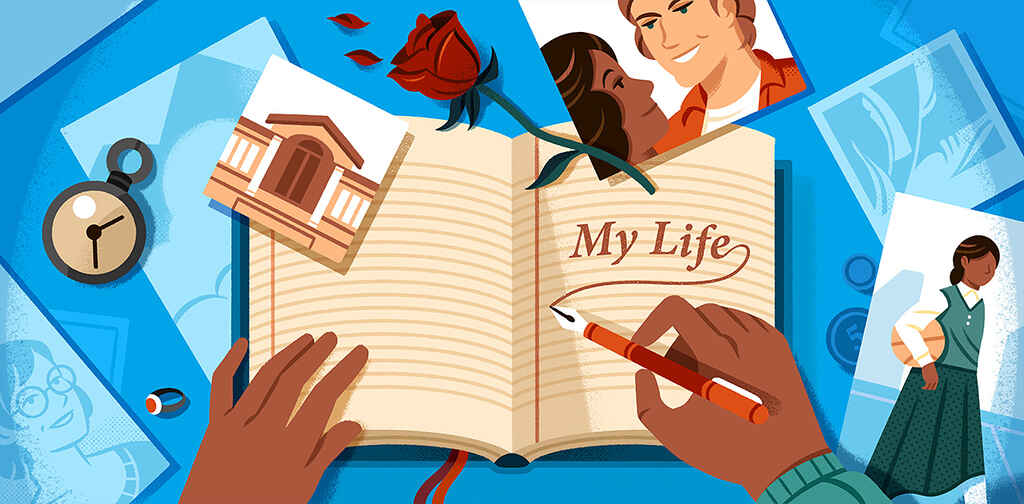
FREE RESOURCE
Memoir Outline Template
Craft a memorable memoir with our step-by-step template.
If you’ve worked through our article on how to write a memoir , you should already have a hand-picked selection of powerful memories. The challenge now is to piece them together, with each memory serving as a crucial puzzle piece in an overarching narrative.
A popular first step is to arrange your stories in chronological order. You could do this on a whiteboard, a notebook, or within your writing software of choice. For example, the Reedsy Book Editor offers an outlining board where you can create notes for your stories, then drag and drop them around.
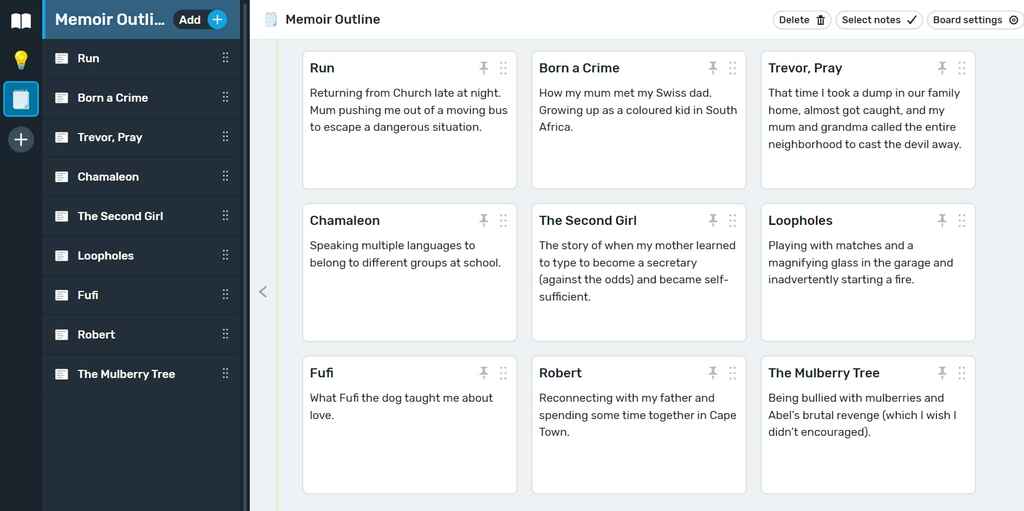
With this bird’s-eye view, it becomes easier to spot patterns and understand what fundamentally connects your stories together, helping you find a suitable structure for your memoir.
👻 Want to collaborate with a master storyteller to bring your memoir to life? Hire a ghostwriter! They'll handle everything in the background, but your name will be the one on the cover.
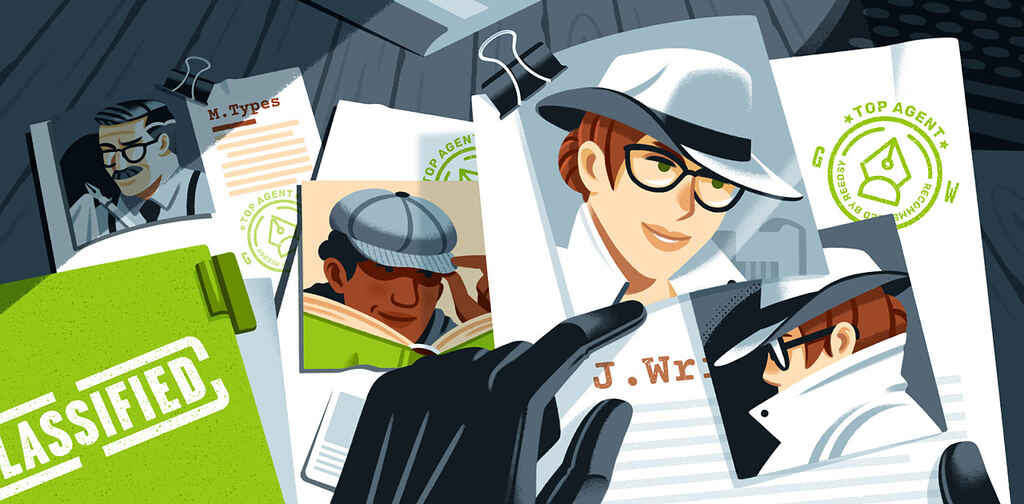
MEET GHOSTWRITERS
Find a ghost you can trust
Your mission? A fantastic book. Find the perfect writer to complete it on Reedsy.
Filmmaker Jean-Luc Godard once said that every story “has a beginning, a middle, and an end — not necessarily in that order.” When it comes to telling your own story, there isn’t a single way to structure them 一 you'll have to figure out what will have the greatest impact. To help you along, look at some of the most common memoir structures authors use. Three, in particular, stand out:
Chronological. For memoirs that cover a specific time period or event of the author’s life and have a clear, chronological timeline (e.g. defeating cancer, or climbing Mount Kilimanjaro.) For example, Jon Krakauer’s Into Thin Air recounts the 1996 Mount Everest disaster by chronicling the ascent, summit, and descent of the mountain.
Before/After. For memoirs that revolve around a particular event so central to the story that it makes sense to organize the book in a Before/After format, where the narration keeps cutting before and after that event occurred (e.g. being sentenced to jail, or surviving a hurricane). In Lee Lawrence's The Louder I Will Sing , the author describes his life before and after his mother was wrongly shot by police during a raid on their home, using the contrast to describe the two strikingly different realities he experienced.
Theme-based. For memoirs that aren't linked together by a specific timeframe, but rather a common theme, with each story offering a unique perspective into the author's life, yet all coalescing around a central theme. A good example is Trevor Noah's memoir Born a Crime, which explores his experiences as a mixed-race child growing up in Apartheid South Africa. Noah shares a range of poignant and often humorous stories, from going to Church with his mum to selling CDs to his first date, which all grapple with the book’s central themes of resilience and identity.
When outlining your own memoir, play around with your story notes and see if you can arrange them in a unique way that emphasizes your central message or story arc. If you find this especially challenging, don’t despair. You can always collaborate with a book coach 一 they’ll help you make sense of your tales and neatly organize them into a powerful narrative.

GET ACCOUNTABILITY
Meet writing coaches on Reedsy
Industry insiders can help you hone your craft, finish your draft, and get published.
But in the end, the old ways are often the best — and most stories are best suited to having a distinguishable beginning, middle, and end. Most often, the strongest outline is one that follows a chronological, novel-like structure. To that end, we’ve created a free downloadable template that will help you deconstruct your memoir scene by scene and synthesize an overarching narrative.
Let’s dive deeper into your memoir outline and see that your story hits all the right chords.
It’s never a bad idea to start your memoir with a moment of high emotion. When deciding whether your book is worth reading, readers will skim through the opening passages , either in-store or with Amazon’s Look Inside feature. If the first few pages don’t grab them, they won’t buy it. To engage readers from the get-go, open with a powerful moment from the middle or even the end of your story .
For example, Cheryl Strayed’s memoir Wild (which we’ll reference throughout the rest of this post) doesn’t start with her mother’s death, failing marriage, or struggle with drugs. Instead, it begins on day 38 of her hike along the Pacific Crest Trail (PCT) when Strayed accidentally drops one of her hiking shoes off a cliff. It’s a moment of profound helplessness and loneliness, evoking feelings she’s been grappling with since her mother died, ones that she hopes to overcome on her journey.

Strayed hooks her reader right from the prologue . She knows they’ve picked up her book on the promise that they’ll get stories of hiking through the wilderness, and she delivers on it instantly, instead of spending the first 100 pages detailing her mundane ‘normal’ life.
This kind of in medias res opening is an effective way for memoirists to engage the reader right away, and leave them wanting to know more before providing background information and developing the story.
Once you’ve figured out your hook, it’s time to lay the foundation for your narrative. If you’re following the classic Three-Act story structure , this would be your Act One.
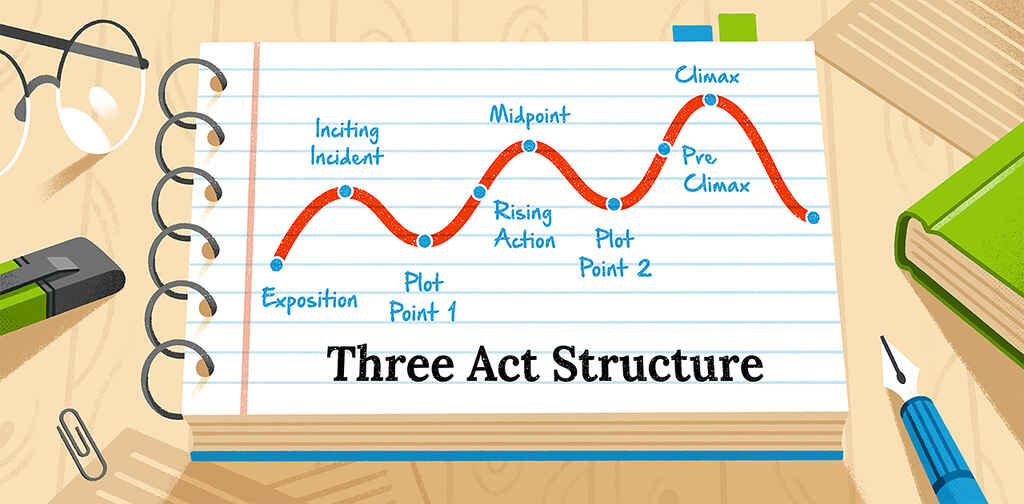
FREE COURSE
How to Plot a Novel in Three Acts
In 10 days, learn how to plot a novel that keeps readers hooked
Some of the story elements you may want to include in the first part of your memoir are:
Exposition
As the main character, you’ll have to provide some background information about yourself (as long as it’s relevant to your memoir’s main focus.) You’ll want to paint a picture of who you were before the story starts, so that readers can follow along as you evolve through it.
In Wild , Cheryl vividly portrays the profound bond she shared with her mother, and how her death set her on a destructive path of substance abuse and infidelity.
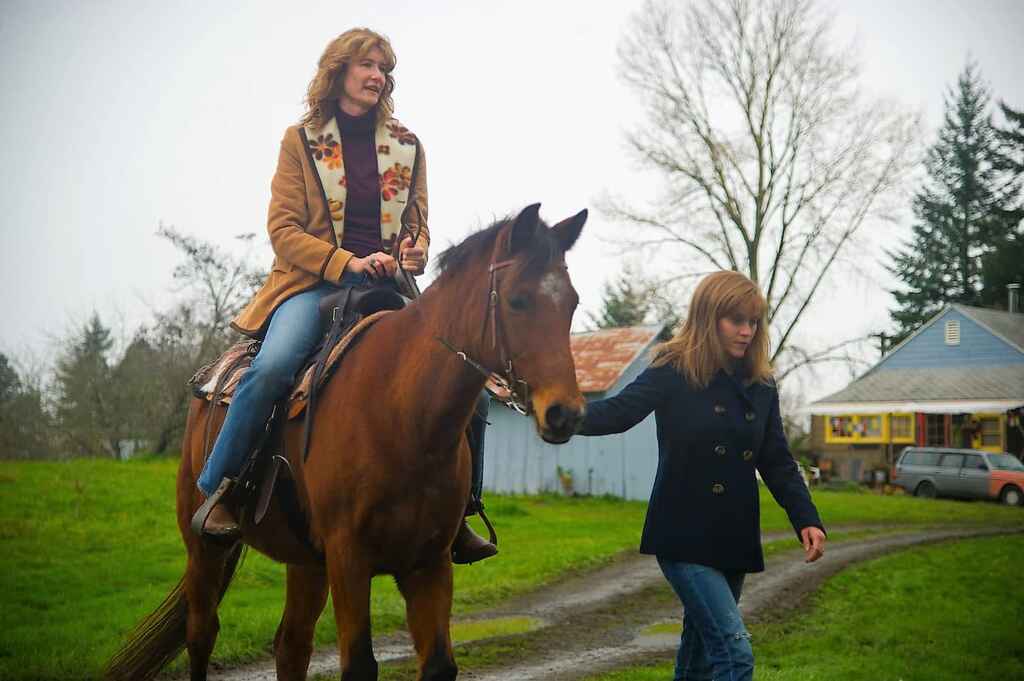
If your memoir is about joining the Navy Seals, this is the part where you share your ordinary life before military training. If it’s about grieving for your late husband, your exposition might detail how you fell in love with each other, and what made your relationship special.
An Inciting Incident
In most cases, you’ll be able to identify a defining moment that set your story in motion, and propelled you on a transformational journey. It’s the moment you fully decide to get out of your comfort zone to achieve your goals and desires.
Cheryl's turning point in Wild comes after she hits rock bottom in the wake of an unwanted pregnancy. Browsing through a store, she impulsively purchases a guidebook for the PCT, thinking that the trail may help her “walk herself back to the woman she once was.”
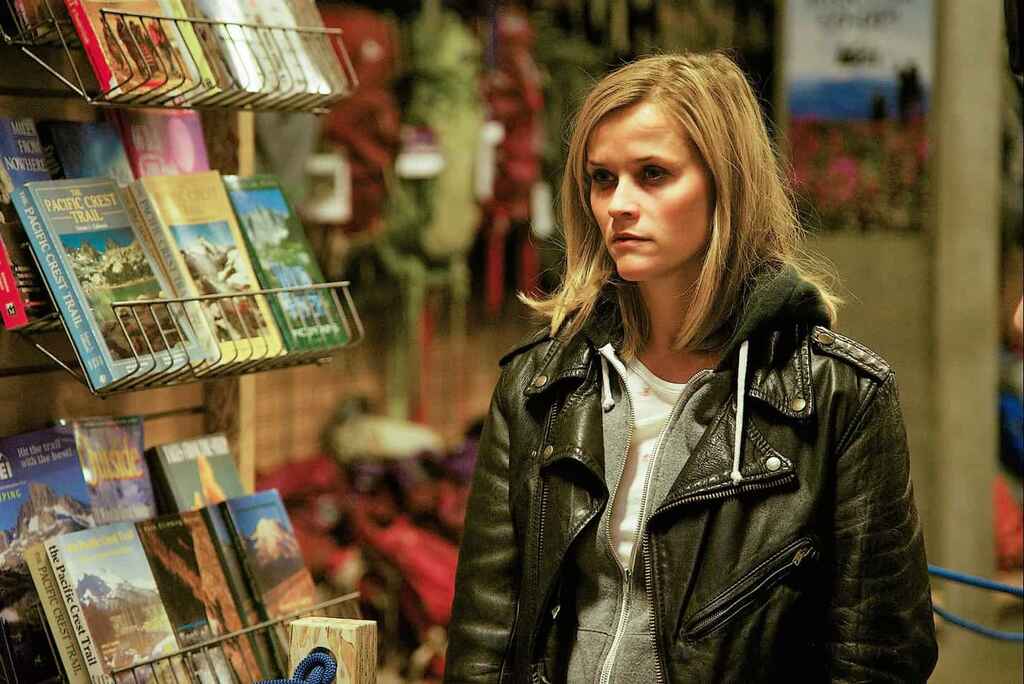
Of course, not all true life stories start with an earth-shaking epiphany or a serendipitous meeting. Maybe your decision to run an Ironman in your 40s was something that was brewing over a number of years, but try to think of a moment of high emotion that contributed to that choice. Was it the day you were fired from your job, or the time when a kid on the street called you 'old'? This moment could very well be your inciting incident.
Introduction of Main Theme
As your story develops, make sure that your personal objectives are tied to a larger, universal theme that can resonate with your readers. In Cheryl's story, her primary goal is to hike the PCT, but on a deeper level, her quest touches on the themes of redemption and self-discovery. As she writes in the first pages of the book:
“It was a world [the trail] I’d never been to and yet had known was there all along, one I’d staggered to in sorrow and confusion and fear and hope. A world I thought would both make me into the woman I knew I could become and turn me into the girl I’d once been.”
Think about what your memoir's theme really is (e.g. parenting, mental health, social inequality) and spotlight it from the very beginning.
Now that your story is truly in motion, with backstory, an inciting incident, and thematic heft, it’s time to get into the nitty-gritty.
The second act of your memoir is often the trickiest. This is the section where you will usually deliver on the ‘ promise of the premise ’: if your book is about becoming an astronaut, this is the part where you’ll undergo training and plan for your mission. If you’re writing a memoir about hiking the wilderness, you better be in the woods by the start of the second act.
The tough part comes with making sure that you’re building momentum, increasing the stakes, and not just telling anecdotes that don’t contribute to the bigger picture. For this reason, a memoir’s second act usually sees your hero (you!) responding to bigger and bigger obstacles.
Here are a few key plot points to consider to keep your narration strong:
Rising Action
During this part of the story, you usually face external and internal challenges in order to achieve your goal. The key to maintaining credibility is to share both your failures and successes, moments of both fear and courage.
On her first sleepless night camping on the trail, Cheryl is terrified of animal sounds. But as she grows more confident each day, she starts to join in with their howls. Despite her undersized boots, her heavy backpack, and her lack of camping experience, she manages to walk 100 miles through the Mojave Desert and reach the first campground. She also learns to trust strangers and ask for help, especially when it comes to letting go of some of her unnecessary baggage.

The rising action in your story may be less adventurous than in a travel memoir. If your topic is recovering from addiction, for example, it may include getting into arguments at Alcoholics Anonymous, before developing an uneasy friendship with your sponsor and growing more confident in your ability to get better.
This is a turning point in your story, like a crisis, triumph, or simply a realization, that pivots your journey in a new direction. Usually, it’s a moment that carries significant emotional weight and sets the stage for the climax to come.
Despite her growing confidence, Cheryl is forced to reckon with her emotions. This is when she loses her boots and feels helpless, used as the story hook. This time though, we get to see how she reacts: she reinforces her sandals with duct tape and keeps marching forward, with ever more strength and determination.
Dig around your memories and try to identify that path-altering, highly emotional moment 一 it may be your midpoint. In a memoir chronicling the journey of building a successful startup, the midpoint may be a promising call from angel investors, willing to pour some money into your idea. It’s the moment when things turn around.
It’s time to outline the final act of your memoir to end on a strong note and with a powerful message.
The Third Act is where the main conflict of your story is finally resolved, so the stakes and tension should be at their highest. Some of the key plot points to outline in this last section are:
This is where you introduce your greatest challenge for the final act of your manuscript. It often involves a series of events that further escalate the conflict and heighten the anticipation for the ultimate resolution.
In Wild , Cheryl deals with debilitating thirst, dodgy hunters, and a heavy storm, but more importantly, she revisits some of her most painful memories, from the abuses of her alcoholic father, to the heart-wrenching task of putting down her mother's cherished horse after her passing.
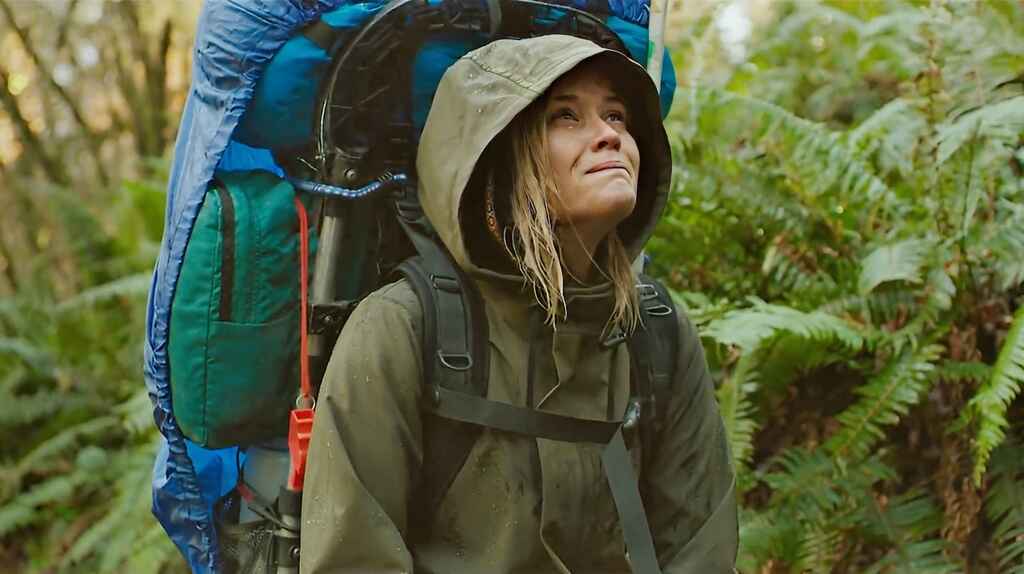
In your memoir, this is the moment before the end of your story that threatens to dash your dreams once and for all. It may be the moment when a global pandemic hits, countries close borders, and flights to Vanuatu are suspended, threatening your quest to visit every single country in a year.
This is the point where the central conflict or challenge of your memoir comes to a head. It’s the culmination of everything you've built up to, and it should feel like a defining moment in your life. For Cheryl, it’s finally reaching the Bridge of the Gods and completing the PCT after a three-month-long hike. In your story, it may be the moment you complete an Ironman, sell your successful startup, or finally land in Port Vila, the capital of Vanuatu.
Resolution/Thematic Wrap-Up
The resolution is an opportunity for you to show the results of your journey and how you’ve changed as a result of it. Here you can again address the central theme of the book, sharing the lessons you’ve learned and how your perspective has changed over time.
For Cheryl, it’s all about redeeming her turbulent past 一 from cheating to heroine 一 owning up to it, and rediscovering that inner strength and beauty she had lost touch with. In your memoir, this is the time to reflect on what you learned from overcoming addiction or running a race, and muse on how you have been able to move forward since.

Aaand scene! It's important to keep in mind that every memoir is unique and may require a distinctive structure, but we hope that our suggestions and template will provide you with a solid foundation to write with more clarity and get that memoir published.
Also, remember that writing a book is a marathon. After outlining, writing, and publishing your memoir, you'll have to publish it! Proceed onto our post teaching you how to publish a memoir and rest assured that you have a solid roadmap in front of you.
Evelyn Sinclair says:
04/03/2018 – 21:17
I've read a lot of the Reedsy information about memoirs, finding it all very helpful and I'm around 20,000 words in. Recently I'm struggling over how to bring it to an interesting end, and whether I can reach the length of a novel.
Comments are currently closed.
Join a community of over 1 million authors
Reedsy is more than just a blog. Become a member today to discover how we can help you publish a beautiful book.
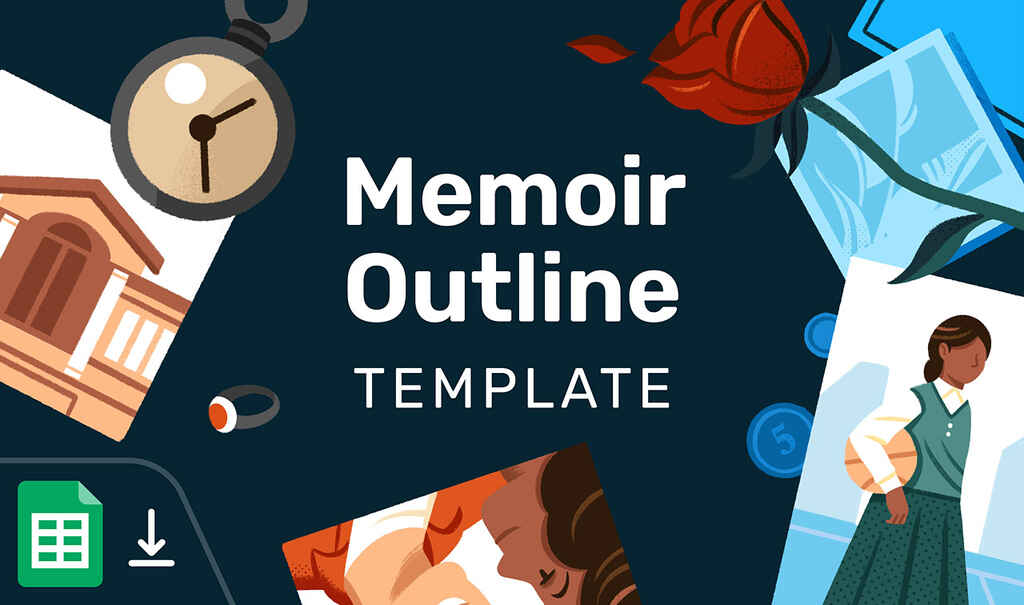
Structure your memoir for maximum impact
Use our free template to plan an unputdownable memoir.

1 million authors trust the professionals on Reedsy. Come meet them.
Enter your email or get started with a social account:

🖋 50 Impactful Memoir Writing Prompts to Get You Writing TODAY
If you’re thinking about writing your memoir but facing a blank page, I have a few great memoir writing prompts that will get you writing TODAY . Let’s do this! ⚡️
Writer’s Block? Nah!
Creative writing prompts are useful tools for unlocking memories so you can get your life stories onto the page. I have a deep respect for the creative process, and I’m a fan of creative writing prompts because they work. They’re a diving board into your memories, helping to unlock past experiences you may have forgotten. If you struggle with writer’s block, memoir prompts are more like the well-meaning swim coach that gives you a purposeful nudge, right into the water. Once you’re in, you’re in! 🏊🏻♀️
Writing is an intuitive process, and this is especially true for memoir . It can be helpful to think about specific memories or moments in your life that were particularly meaningful to you. Other times, it can be helpful to focus on a specific theme or area of your life that you would like to explore in your writing. Don’t be surprised if you end up pivoting in a different direction, too. If you stay open, the story you are meant to write will reveal itself to you (this might sound silly, but it’s been true for me and all the books I’ve written ).
Creative writing prompts can be a warm-up to the actual writing, or the writing itself. You can decide the shape of your memoir once you know what you’re writing about and have generated enough material that can serve as the foundation of your memoir. You can smooth your prose and make everything cohere into a memoir everyone will want to read. 🤗
But right now? Get writing.
Using Creative Writing Prompts
Creative writing prompts and writing exercises that help you write your memoir by providing structure and ideas to get you started. They offer simple but thoughtful questions to help you excavate the stories that are wanting to be discovered. ⛏
Prompts can be as simple as asking you to describe a significant event in your life, or they can be open-ended, like asking you to write about a specific theme or feeling. Sometimes you’ll end up writing about something completely different than the memoir prompt, and that’s okay. Trust wherever it takes you.
The more writing you do, the more memories will get unlocked. Not only that, but a little bit of writing each day adds up to a lot of writing if you just keep going . And as an added bonus, you’ll be developing your writing skills with each prompt you write. 🏋🏻♀️
Memoirs are a great way to share your life story with the world. These prompts will help you get the most out of your writing and get your creative juices flowing.
Why Memoir Writing Matters
Memoir writing as a creative process that serves the writer and ultimately the reader. 🤓
For the writer, writing our personal narratives is a way to remember and process our own life experiences, to help us understand the significant events of our lives that helped shaped who we are. Writing these stories down can be a source of comfort and healing, providing a space to reflect on our past and make sense of our present. They offer a creative outlet for exploring our thoughts, feelings, and memories, and are a great way to connect with our past selves.
For the reader , memoirs can be a source of inspiration for others, offering a glimpse into someone else’s life and providing hope, motivation, and insight. I’ve always viewed memoir as proof that we’re not alone, that others have been through similar experiences and can relate to us. Great stories help us appreciate what we have in the present moment, and offer compassion for ourselves and others.
What are Some Good Memoir Topics to Write About?
Unless you already know what you want to write about in a memoir, and it can be difficult to know where to start. 🤷🏻♀️
Some good topics include your childhood, your family and friends, your education and career, your hobbies and interests, and any significant life events. These topics can also be used as creative writing prompts to help you get started on writing your memoir, even if you plan to focus on something different.
Most memoirs have a specific theme. Check out this free printable list of 125 themes from my book, Writing the Hawaiʻi Memoir: Advice and Exercises to Help You Tell Your Story (Watermark Publishing).
Memoir Prompt Writing Tips
Before you begin, here are a few things to keep in mind.
Be honest and raw
Be honest with yourself and your writing. Don’t worry about putting on a show or looking perfect. Don’t start changing family members’ names because you’re worried they’ll get mad. Remember that no one is going to see your work at this stage unless you show it to them.
Experienced memoir writers know it takes many drafts to get to a polished manuscript, but you have to start at the beginning, and beginnings are usually pretty messy. Give yourself permission to write without any inhibitions — no censoring of your words or thoughts. Just get it down, and then decide what to do with it once you’re finished. If you really hate it or feel horribly embarrassed, you can always toss it out. But you probably won’t. 😉
Write by hand
When it comes to writing prompts, I’m a strong proponent of writing by hand. Before you panic, you’ll only be doing this for ten minutes (see below), and there’s a connection that’s made between the brain and the page when you write by hand. I do most of my writing on my computer — I’m a fast typist and a fast thinker, so I prefer to have my fingers on the keyboard … except when I’m responding to a prompt. Something important happens when we write by hand, and it gets missed when we’re on the computer or on our phones.
If you’re not convinced, try it for one week and see what happens. 👋🏼
Establish a daily writing practice
When you decide you’re going to write, a daily practice helps keep you on track. Have a writing process in place ensures that you get the writing done, and with each day that passes, you become a better writer.
Some memoir writers swear by Julia Cameron’s morning pages , which I love but don’t always have the time to do. My recommendation is to set the bar low — begin with writing ten minutes a day. Choose a prompt, set the timer, and keep your hand moving (thank you, Natalie Goldberg ). When the timer goes off, stop.You can spend another 10 minutes revising and reshaping the work, or you can put it aside to rest.
If you do this daily, you’ll have 365 individual vignettes by the end of the year (366 if it’s a leap year). Whether you choose to use them in your memoir is up to you, but these are excellent starting points and you’ll usually find some gems in there, which you can submit individually to literary magazines or string together into a collection of personal essays or narratives.
The most important thing is to write, and write daily. 📆
Tell a story and give us details
Every memoir tells a specific story the writers wants to share. Memoirs are not a recounting of every fact or statistic of your entire life like an autobiography or biography, but a glimpse into a particular moment.
I like to use the example of a photograph — sometimes what is outside the frame is just as important as what’s inside the frame. Use sensory details to bring us in the moment with you. What’s happening?
When you’re ready, and once you’ve selected the pieces you want to spend time on, you can revise your work. This will give you a chance to do a deeper dive into whatever it is that want to say, and shape the work for a reader. But again, you don’t have to worry about that now, just be assured that you can “fix” whatever you need to fix, later. 👩🏻🔧

Mem oir Writing Prompts & Ideas
Let’s get started! Use the following memoir prompts to get your creativity flowing. These open-ended prompts are very flexible so choose at random, switch them up, make them yours. Use them as a starting point, trust the process, and GO. 🏃🏻♀️
- The Alphabet Autobiography (similar to the abecedarian poetic form). You’ll write one sentence of line for each letter of the alphabet, from A to Z. Start with the letter A, and think about something (or someone) in your life that begins with A. It doesn’t have to “important” — don’t overthink it. Go with whatever comes up first, and keep going until you reach the end of the alphabet.
- Write about a family heirloom.
- What were the cartoon characters of your childhood, and which one did you identify with?
- Write about your first best friend.
- Not everyone has owned a pet, but we all have animal companions in some form. Think stuffed animal, class pet, a totem animal. Write about the first one that comes to mind.
- Write about a favorite teacher.
- What’s the first thing you did this morning?
- Have you ever had a near-death experience?
- Write about your first love.
- What was the most embarrassing thing that happened to you in high school?
- What is the best memory you have of a place you traveled to?
- When was the last time you saw a relative you don’t know very well? Tell us what you think about them. How are they related to you?
- Tell us about your favorite article of clothing. Where did you get it, why do you love it, what does it say about you?
- What was the first thing you ever bought yourself?
- What is your favorite gift you’ve ever given (or received)?
- Who do you love to spend time with? Why?
- Think of a time you lied.
- Think of a time when you stole something.
- Think of a time when you laughed so hard, you cried.
- Think of a time when you felt triumphant.
- Think of a time when you were completely and utterly in love.
- What was the worst day of your life?
- What’s your favorite season? Why?
- What’s your favorite holiday? Why?
- When you were the happiest you’ve ever been?
- When you were the saddest you’ve ever been?
- What is one of your most vivid memories of your parents?
- When was the last time you felt jealous?
- Write about a random act of kindness someone did for you.
- What is your favorite smell?
- Write about your name. What does it mean? Do you have a nickname? Does it suit you?
- What is something no one knows about you?
- Tell us a recipe that you make by heart. How did you learn it? How often do you make it?
- Did you have a comfort object growing up? What was it, and when did you need it?
- Write about a recurring dream.
- When you look in the mirror, what feature do you notice first? Write about that.
- What was the first place you ever traveled to?
- How has your worldview changed since you were a child?
- What was your first car?
- When was the last time you went swimming?
- What’s a job would you would love to do?
- How many siblings do you have, and what are their names?
- Tell us about your favorite kind of sandwich.
- Write about your scars.
- What’s your go-to cocktail?
- How many times have you moved in your life?
- Describe the house you grew up in.
- How many tattoos and piercings do you have, and why did you get them?
- Write about the last time you were in nature, and what happened.
- Write about a camping trip.
More Great Resources
- Read this post, 10 Tips on How to Write a Book About Your Life , for an overview of the writing process.
- Read this post, Top 10 Must-Read Books on How to Write a Memoir , which features books by some great writers of the genre.
- Want to know when I add more prompts? Join my newsletter ! 💌
Purdue Online Writing Lab Purdue OWL® College of Liberal Arts
The Personal Memoir

Welcome to the Purdue OWL
This page is brought to you by the OWL at Purdue University. When printing this page, you must include the entire legal notice.
Copyright ©1995-2018 by The Writing Lab & The OWL at Purdue and Purdue University. All rights reserved. This material may not be published, reproduced, broadcast, rewritten, or redistributed without permission. Use of this site constitutes acceptance of our terms and conditions of fair use.
These resources discuss some terms and techniques that are useful to the beginning and intermediate creative nonfiction writer, and to instructors who are teaching creative nonfiction at these levels. The distinction between beginning and intermediate writing is provided for both students and instructors, and numerous sources are listed for more information about creative nonfiction tools and how to use them. A sample assignment sheet is also provided for instructors.
Because the personal memoir is more demanding than the personal essay, for both writer and reader, it doesn’t fit into introductory courses as well as the personal essay. An intermediate level course is a good place to introduce the memoir. However, if the instructor takes the time to explain and introduce the memoir form, it can be adapted for introductory courses.
Difference Between the Personal Essay and the Memoir
While the personal essay can be about almost anything, the memoir tends to discuss past events. Memoir is similar to the personal essay, except that the memoir tends to focus more on striking or life-changing events. The personal essay can be a relatively light reflection about what’s going on in your life right now.
Where the personal essay explores, free from any need to interpret, the memoir interprets, analyzes, and seeks the deeper meaning beneath the surface experience of particular events. The memoir continually asks the following questions:
- Why was this event of particular significance?
- What did it mean?
- Why is it important?
In this sense, the memoir is heavier than the personal essay, and it mines the past to shed light on the present. The memoir seeks to make sense of an individual life. The questions that are left unanswered in Wole Soyinka’s essay from the personal essay resource, Why do I Fast? are answered in the memoir.
Generating Ideas for Personal Memoirs
Moore’s memoir exercise from The Truth of the Matter: Art and Craft in Creative Nonfiction is useful in both beginning and intermediate courses:
“Make a list of six to ten events or circumstances in your own life, or the lives of those very close to you, that still provoke your curiosity. Mine your own life for the events and circumstances that still raise questions in your mind. Once you have the list (and this list should be private - don’t share it with others - and don’t hold back because you think someone else will be looking), pick one of the questions on the list that you are willing to explore.“
The potential questions Moore asks in this exercise are meant to be answered in the memoir. While the memoir tries to make sense of experience, it also shares something in common with the personal essay - the exploration of the question, and the process of trying to arrive at an answer, is at least as important as the answer or resolution you may arrive at.
Writing the memoir is not a simple Q & A with yourself; rather, the complicated process of trying to seek the answers is what makes the memoir engaging to write, and read. Here is an example from Carlos Fuentes’ How I Started to Write :
Fuentes is constantly questioning and answering, interpreting and analyzing his experience, trying to make sense of why and how he did what he did in order to become a writer. He seeks answers and tries to make sense of his life by interpreting his own experience, the cultural and political life of his time, the meaning of language and literary influence, and by stepping over imagined nationalist borders.

Microsoft 365 Life Hacks > Writing > Four tips for writing a memoir
Four tips for writing a memoir
Everyone possesses a life story that’s worth sharing. Life’s experiences, from joys to sorrows, loves, and loves lost, collectively shape us, and connect us through shared human experiences. Because of this connection, memoirs can palpably resonate with readers. The key differentiator between your memoir being a best-seller or relegated to the bargain bin, aside from personal fame and popularity, lies in the quality of your writing. Tell your story in a way that truly resonates with your audience by applying these four invaluable tips for writing a memoir.

What is a memoir?
A memoir is a narrative that highlights a specific moment in an author’s life. Often mistaken for an autobiography, memoirs tend to offer a more intimate perspective. Authors unpack a vulnerable and impactful moment that profoundly influenced them in a way that forges a connection with their readers. These authentic, real-life experiences are shaped by the author’s emotional response to an event, emphasizing personal interpretation and how it affected them rather than serving as a historical account.
Tips for writing a memoir
If you’ve decided to write a memoir, it’s important to remember that you’re not giving an account of your entire life. Instead, narrow your lens and focus on a few specific moments that influenced you, as opposed to an entire autobiography. Now that you understand the essence of a memoir, let’s explore some essential tips to enhance your writing:
Select a snapshot of your life
1. tell the truth.
Above all, your audience must trust you. While a memoir allows you to infuse your feelings and interpretations into events, it must remain grounded in fact, not fiction. Present the events as they occurred truthfully. The essence of a memoir lies in delving deeply into how an event transformed you, so maintain honesty with both yourself and your readers as you write.
2. Make your memoir a narrative with rich characters
Breathing life into well-developed and relatable characters is what truly brings a story to life, whether it’s a poem , short story, or memoir. When referencing people in your life, delve into their character by considering their motivations, their connection to you, and other pertinent factors as you recount your story. This approach allows readers to establish a personal connection with these individuals, making your narrative more engaging and emotionally resonant.

Get the most out of your documents with Word
Elevate your writing and collaborate with others - anywhere, anytime
3. Consider joining a memoir writing group
Give thought to becoming a part of a memoir writing group or workshop. Fellow writers can serve as excellent editors, offering valuable feedback and support. Additionally, such a group can provide you with accountability, enabling you to track your progress while gaining fresh perspectives on your writing.
4. Avoid cliches and stereotypes
To connect with your audience, it’s important to keep your story feeling fresh by steering clear of clichéd phrases and stereotypes in your memoir. Find your unique voice and embrace its originality using colloquialisms , tone , and delivery, allowing your writing to stand out without relying on tropes.
Memoirs possess the inherent power to weave compelling narratives. Effective memoirs, devoid of clichés and stereotypes, can immerse audience members in genuine experiences. Use these tips to dig deep into your personal experiences and deliver truthful, impactful narratives to your audience. For more techniques to captivate readers with accounts of your personal experiences, learn more writing tips .
Get started with Microsoft 365
It’s the Office you know, plus the tools to help you work better together, so you can get more done—anytime, anywhere.
Topics in this article
More articles like this one.

What is independent publishing?
Avoid the hassle of shopping your book around to publishing houses. Publish your book independently and understand the benefits it provides for your as an author.

What are literary tropes?
Engage your audience with literary tropes. Learn about different types of literary tropes, like metaphors and oxymorons, to elevate your writing.

What are genre tropes?
Your favorite genres are filled with unifying tropes that can define them or are meant to be subverted.

What is literary fiction?
Define literary fiction and learn what sets it apart from genre fiction.

Everything you need to achieve more in less time
Get powerful productivity and security apps with Microsoft 365

Explore Other Categories
- Skip to main content
- Keyboard shortcuts for audio player
NPR's Book of the Day
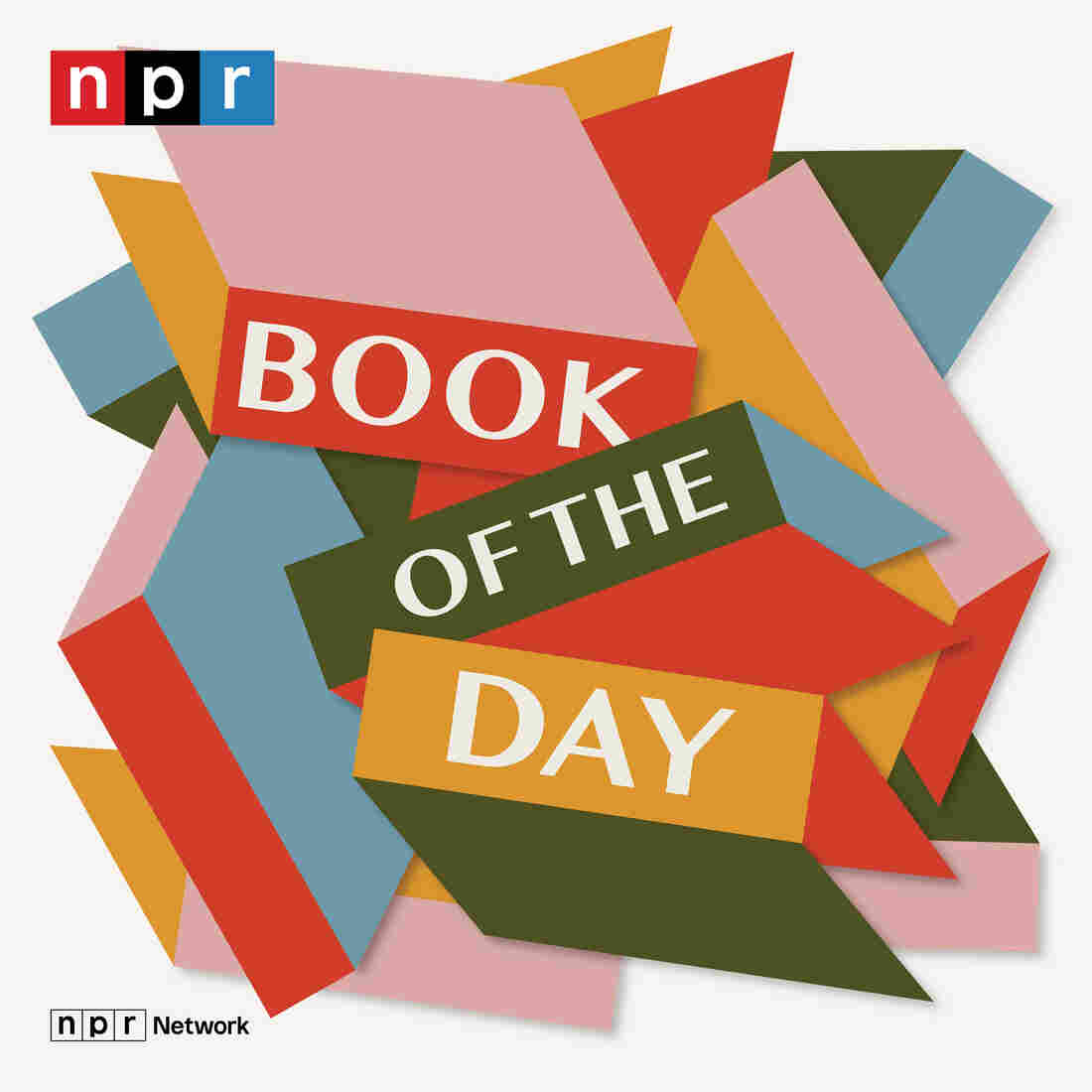
- LISTEN & FOLLOW
- Apple Podcasts
- Google Podcasts
- Amazon Music
Your support helps make our show possible and unlocks access to our sponsor-free feed.
Charles Spencer's memoir 'A Very Private School' opens up about boarding school abuse

A new memoir by historian Charles Spencer, 9th Earl Spencer and brother of Princess Diana, details a difficult childhood marked by alleged physical and sexual abuse at Britain's Maidwell Hall in the 1970s. In today's episode, Spencer tells NPR's Scott Simon how childhood naivete – thinking his parents were all-knowing authorities who must've known about the school's cruelty when they sent him there – prevented him and others from speaking up about what was happening, and why writing A Very Private School felt like an important reclamation of his boyhood.
To listen to Book of the Day sponsor-free and support NPR's book coverage, sign up for Book of the Day+ at plus.npr.org/bookoftheday
Historian Charles Spencer on his memoir 'A Very Private School'
- Skip to content
- Skip to navigation
- Official government website
Action toolbar
- Report Issue
- Translate language select

- City of Santa Ana
Primary menu links
- Departments
City Hall and non-essential City facilities are closed and street sweeping is canceled on Monday, April 1 in observance of Cesar Chavez Day. Learn more.
Memoir and Poetry Writing Class with Professor Donato
All day main library, 26 civic center plaza, santa ana, ca 92701.

During Poetry Month, our library invites you to join our special Memoir & Poetry Fusion class, a unique and inspiring opportunity to explore your personal memories through the lens of poetic expression. This program blends the beauty of poetry with the depth of memoir writing, providing a platform for you to tell your life’s story in verse. Contact us at 714-647-5250 for more information.
Durante el Mes de la Poesía, nuestra biblioteca lo invita a unirse a nuestra clase especial de Fusión de Memorias y Poesía, una oportunidad única e inspiradora para explorar sus recuerdos personales a través del lente de la expresión poética. Este programa combina la belleza de la poesía con la profundidad de la escritura de memo-rias, brindándole una plataforma para que cuente la historia de su vida en verso. Contáctenos al 714-647-5250 para recibir más información.
More upcoming events
Free household hazardous waste drop-off event, rain or shine.
March 30, 2024
EGG-Cellent Adventure
Free spring bicycle ride & learn how to compost, super saturdays storytime, let’s talk about it book club: historical fiction.
All events »
This content is for decoration only skip decoration .

IMAGES
VIDEO
COMMENTS
Here are 10 phenomenal memoir examples you can read online right now for free. Related: The Best Essay Collections to Add to Your TBR List "Me Talk Pretty One Day" by David Sedaris. Photo Credit: Chris Karidis/Unsplash; Comedian and author David Sedaris wrote the memoir essay "Me Talk Pretty One Day" about his time living in Paris to learn ...
JOAN DIDION, "GOODBYE TO ALL THAT". Didion is one of the foremost literary memoirists of the twentieth century, combining journalistic precision with self-aware introspection. In "Goodbye to All That," Didion recounts moving to New York as a naïve 20-year-old and leaving as a disillusioned 28-year-old.
I remember playing in the backyard with my siblings, chasing butterflies, and building forts out of blankets. These…. Childhood Memories. 1 2 … 7. Absolutely free Memoir Essay examples provided by straight-A students. Variety of topics to choose from, easy to download. You can even order custom essay from our top writers.
Examples. Walden by Henry David Thoreau. In July of 1845, Henry David Thoreau walked into the woods and didn't come out for two years, two months, and two days. This is the seminal memoir that resulted. Into Thin Air: A Personal Account of the Mount Everest Disaster by Jon Krakauer.
Besides essays on Book Riot, I love looking for essays on The New Yorker, The Atlantic, The Rumpus, and Electric Literature. But there are great nonfiction essays available for free all over the Internet. From contemporary to classic writers and personal essays to researched ones—here are 25 of my favorite nonfiction essays you can read today.
Black Is the Body: Stories from My Grandmother's Time, My Mother's Time, and Mine. Author: Emily Bernard. Described as a "memoir of sorts", professor of African American Studies Emily Bernard explores race, motherhood, adoption, and her experience of getting randomly attacked by a stranger with a knife.
7. How to Write a Memoir: Edit, edit, edit! Once you're satisfied with the story, begin to edit the finer things (e.g. language, metaphor, and details). Clean up your word choice and omit needless words, and check to make sure you haven't made any of these common writing mistakes.
The Glass Castle by Jeannette Walls. Brain on Fire by Susannah Cahalan. Irritable Hearts by Mac McClelland. The Empathy Exams by Leslie Jamison. Hunger by Roxane Gay. A Sliver of Light by Shane Bauer, Joshua Fattal and Sarah Shourd. 100 more great nonfiction books. Great examples of short memoir essays and personal narrative in creative nonfictio.
While the personal essay has enjoyed continued popularity, a book-length collection of linked essays, centered on an author's self or life, is less common than a traditional memoir or novel. A truly successful essay collection can reveal the author processing experiences at many different points in time and through many different lenses. As a writer, […]
"On Writing" by Stephen King, free with Audible trial, $12.99 on Kindle, $14.56 for paperback Both memoir and mentorship, "On Writing" is a must-read for any aspiring writer, Stephen King-lover ...
2024 Memoir Prize For Books-Deadline Extended- February 29, 2024! Posted on December 31, 2023. Deadline Extended: February 29, 2024! Now, in its 4th year, the Memoir Prize awards Memoir and Creative Nonfiction book length works of exceptional merit in the... Healing / COVID / 7 Minute Read / Adversity / Black Memoirs Matter / Escape / Featured ...
Let's jump in. 1. "They called him Moishe the Beadle, as if his entire life he had never had a surname.". From Night, a first-hand account of the WWII Holocaust by Elie Wiesel. 2. "My mother is scraping a piece of burned toast out of the kitchen window, a crease of annoyance across her forehead.". From Toast: The Story of a Boy's ...
Moving paragraphs. Breaking up stories into parts. Adding just a bit more here and there. Writing an introduction and a final note to the reader. Two years after I wrote the first "dress story" for a memoir class, the book was published as Reflections: A Wardrobe of Life Lessons.
This is the heart of this Coursera specialization in Memoir and Personal Essay. Masters of both genres share tips, prompts, exercises, readings and challenges to help every writer imagine, construct and write compelling pieces of non-fiction's most popular form: the personal narrative. Applied Learning Project.
Below are MANY free memoir-writing resources to help you learn better memoir writing. My Memoir Education ~ The My Memoir Education membership is free as it gets. There is no fee for this program which offers you much by way of long-distance learning: e-courses, e-books, interviews with master writers, whitepapers, bi-weekly Writers' Guides ...
Memoir Ideas #4: Make it universal. Great memoirs tell stories that are simultaneously uniquely personal and widely relatable. Let the individual details that make your story your own shine through—while also giving your readers an access point to connect through their own experiences. Memoir Ideas #5: Show some growth.
So, if you're looking to write your memoir, one of the following 14 best online memoir writing courses, free and paid, may be able to help. . 1. Write Your Memoir Course - UK Writers College. This course "helps you to get to grips with the building blocks of memoir writing.
Divide your essay into sections that chronologically or thematically explore different aspects of your life or experiences. Use vivid descriptions, anecdotes, and dialogue to bring your memories to life. It's crucial to maintain a logical flow and transition smoothly between different ideas or events. As you approach the conclusion, summarize ...
This is a great memoir writing online course for all levels of writers, and it's free! Whether you have not written a word or are already composing your memoir, this free memoir writing course will help you to calibrate—or recalibrate—your effort. Master easy and effective techniques for a successful writing launch—or relaunch—taught ...
Memoir Outline Template. Craft a memorable memoir with our step-by-step template. 1. Order your stories chronologically. If you've worked through our article on how to write a memoir, you should already have a hand-picked selection of powerful memories. The challenge now is to piece them together, with each memory serving as a crucial puzzle ...
Most memoirs have a specific theme. Check out this free printable list of 125 themes from my book, Writing the Hawaiʻi Memoir: Advice and Exercises to Help You Tell Your Story (Watermark Publishing). Memoir Prompt Writing Tips. Before you begin, here are a few things to keep in mind. Be honest and raw. Be honest with yourself and your writing.
Where the personal essay explores, free from any need to interpret, the memoir interprets, analyzes, and seeks the deeper meaning beneath the surface experience of particular events. The memoir continually asks the following questions: ... Writing the memoir is not a simple Q & A with yourself; rather, the complicated process of trying to seek ...
3. Consider joining a memoir writing group. Give thought to becoming a part of a memoir writing group or workshop. Fellow writers can serve as excellent editors, offering valuable feedback and support. Additionally, such a group can provide you with accountability, enabling you to track your progress while gaining fresh perspectives on your ...
Improve your writing with AI. Improve your academic performance and write like a pro without cheating or jeopardizing your degree. Get access to free AI writing tools, useful ChatGPT prompts, the latest articles about AI, and more. Start writing.
A new memoir by historian Charles Spencer, 9th Earl Spencer and brother of Princess Diana, details a difficult childhood marked by alleged physical and sexual abuse at Britain's Maidwell Hall in ...
During Poetry Month, our library invites you to join our special Memoir & Poetry Fusion class, a unique and inspiring opportunity to explore your personal memories through the lens of poetic expression. This program blends the beauty of poetry with the depth of memoir writing, providing a platform for you to tell your life's story in verse.